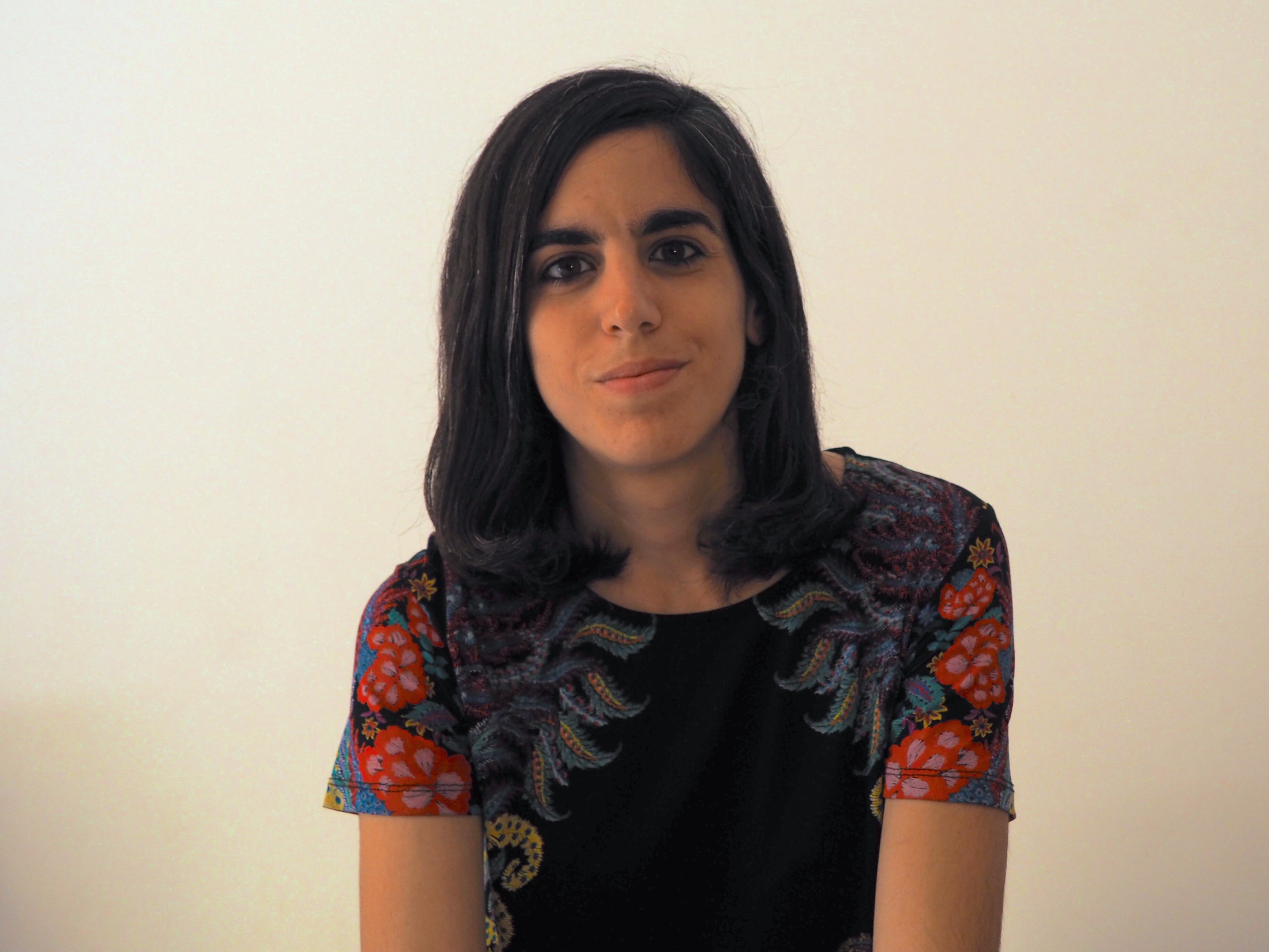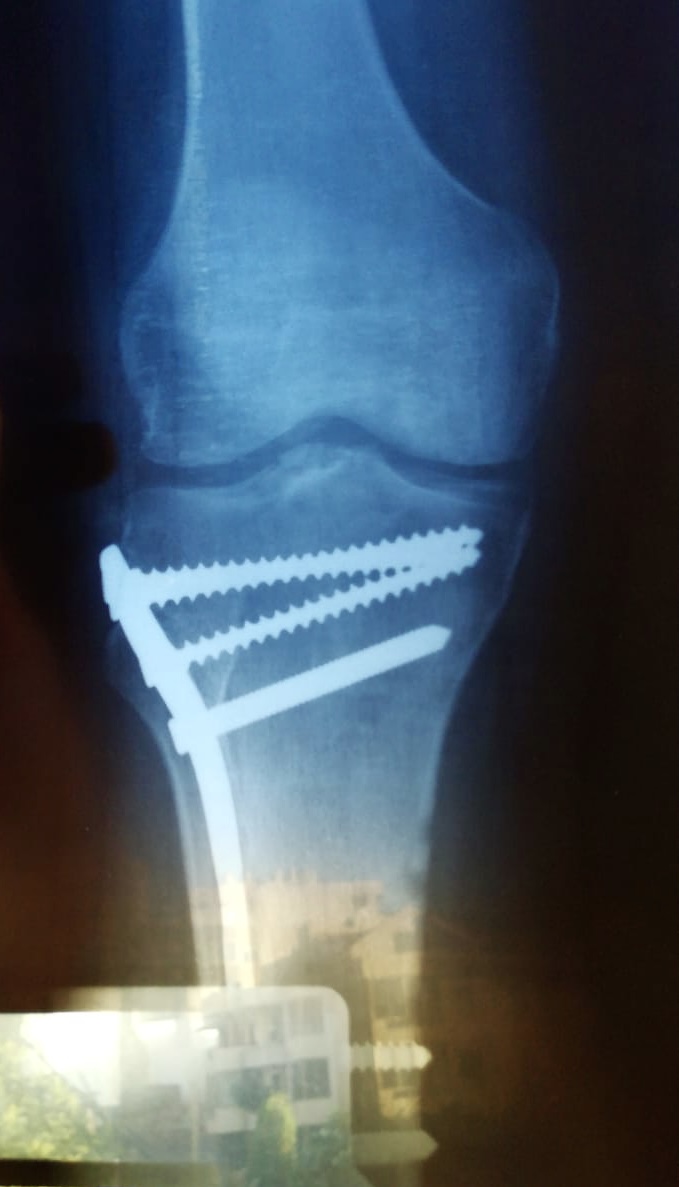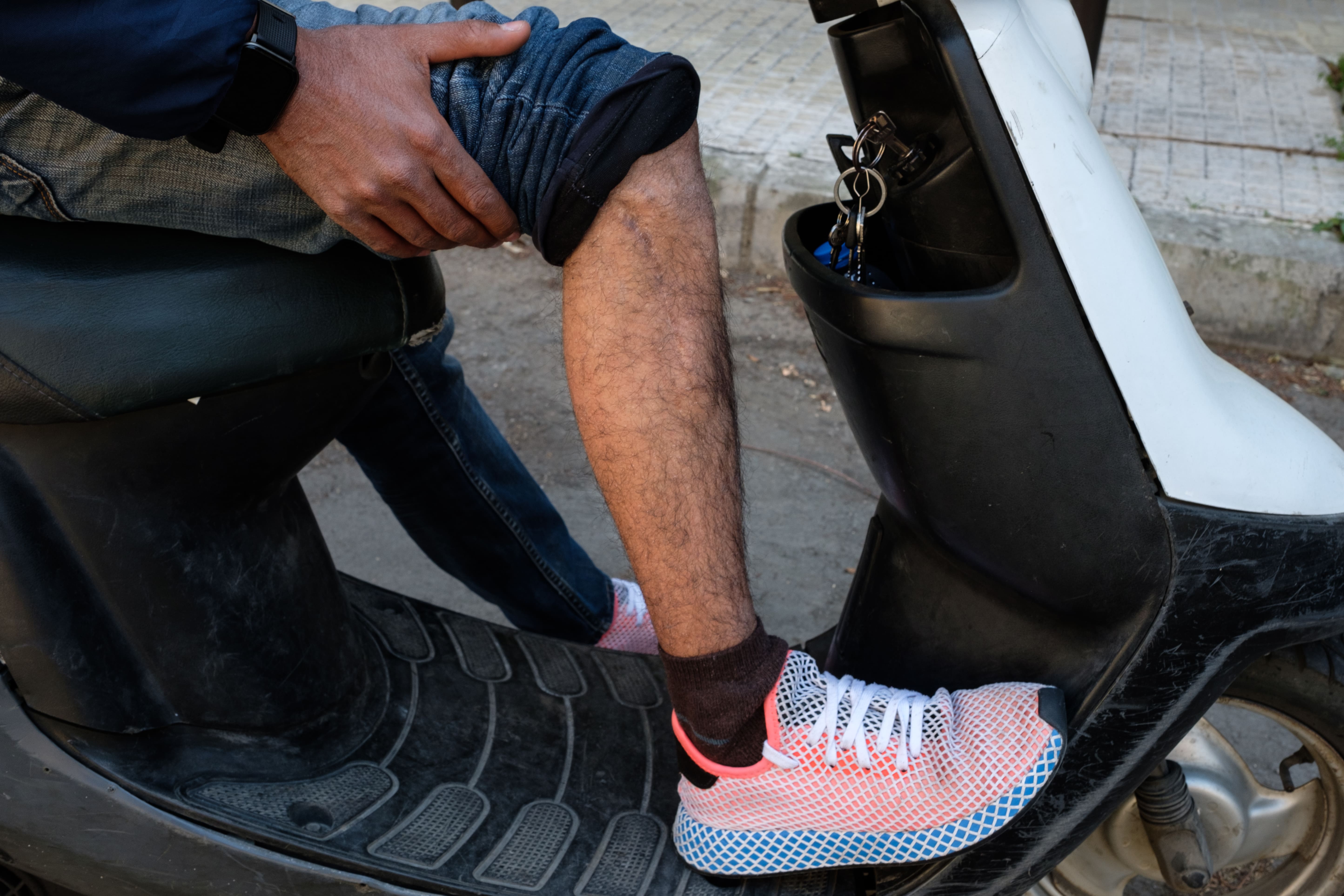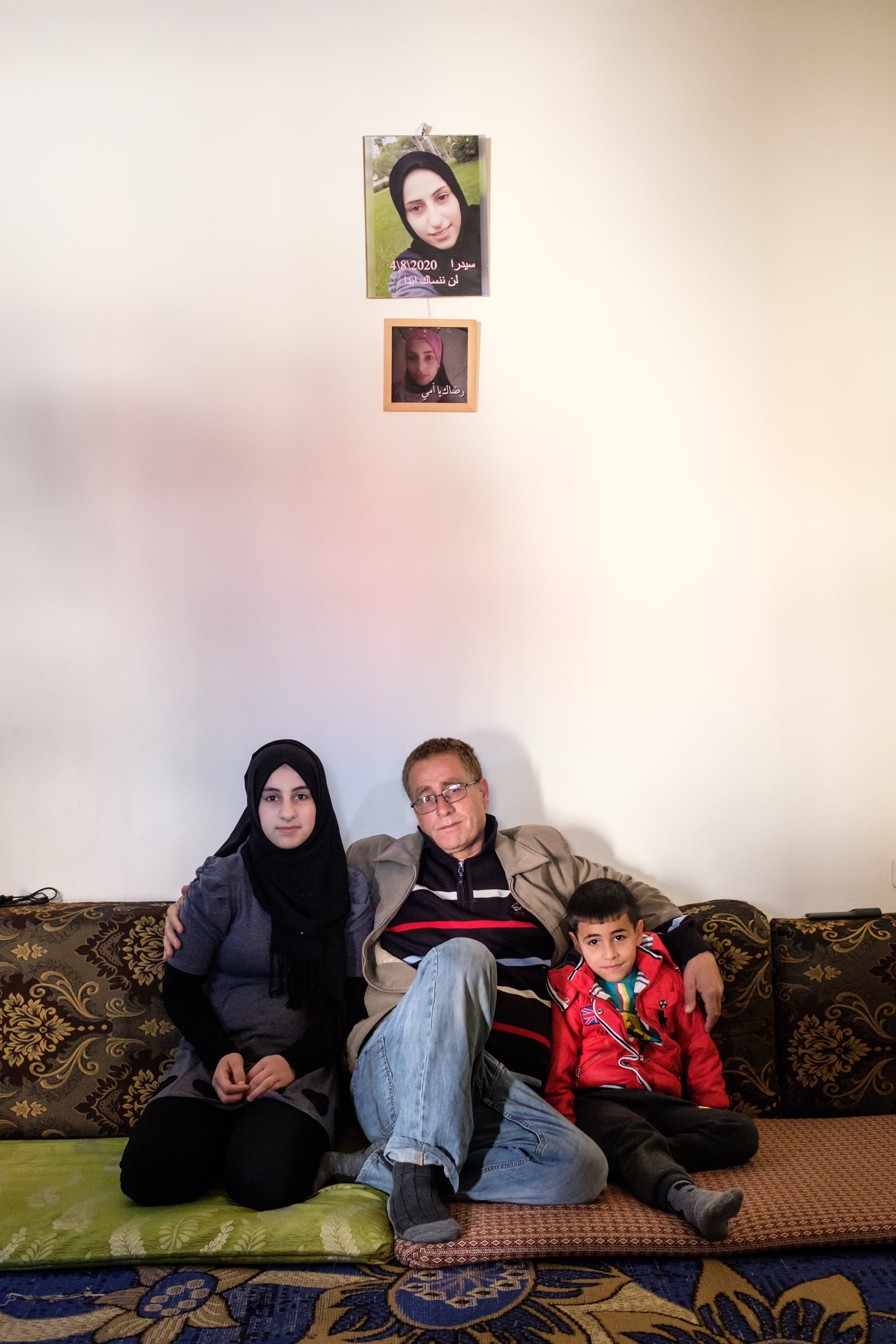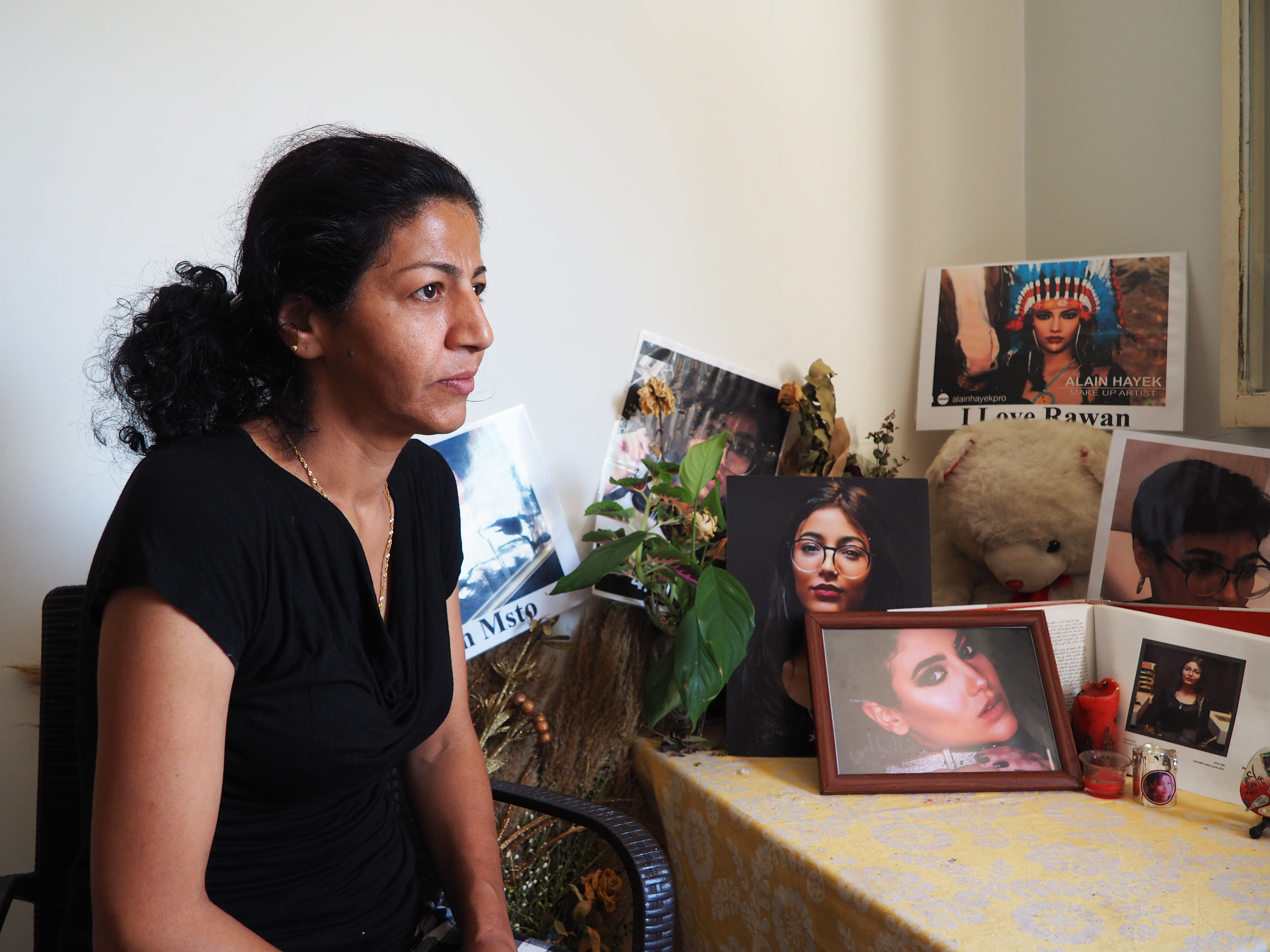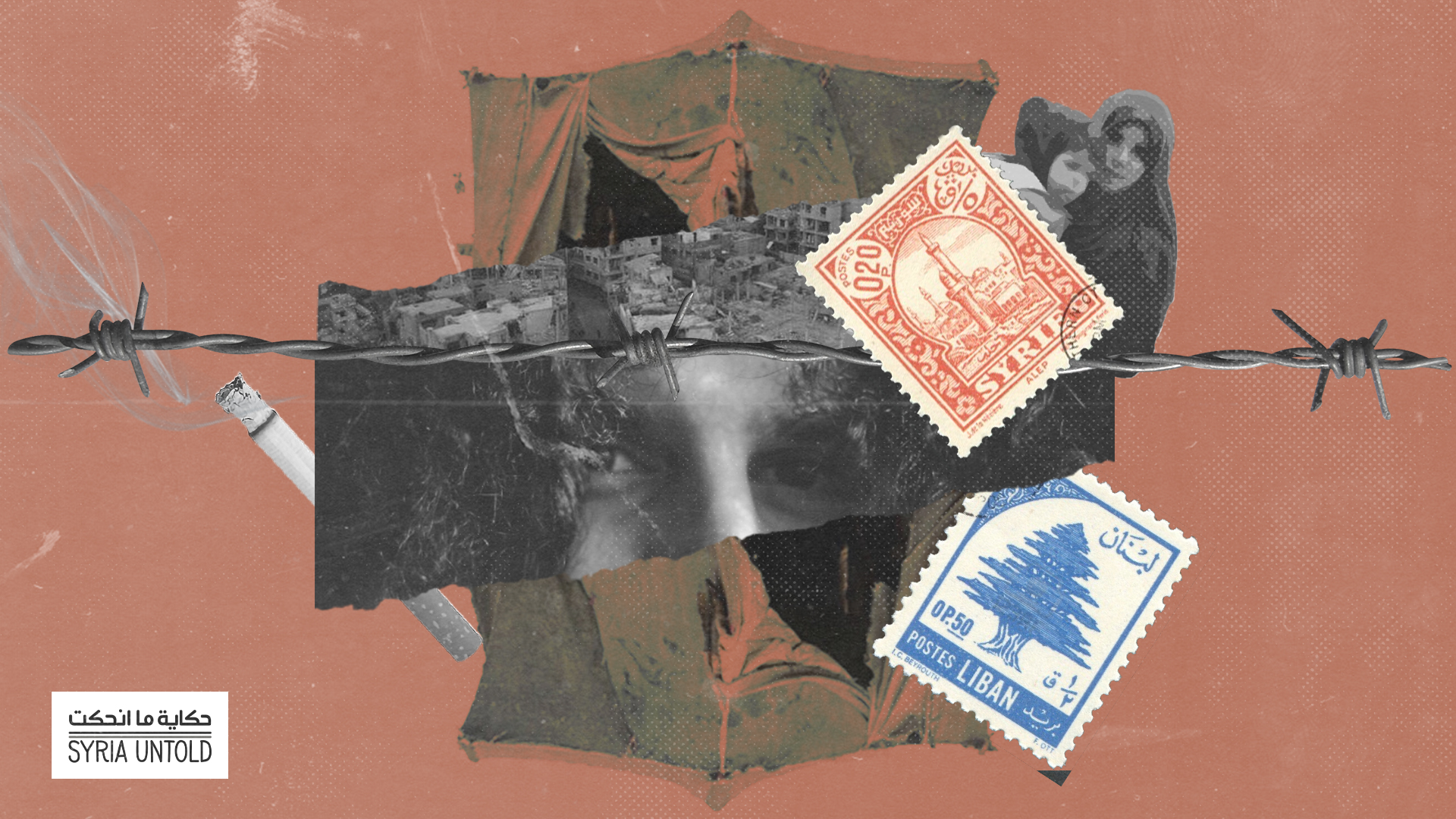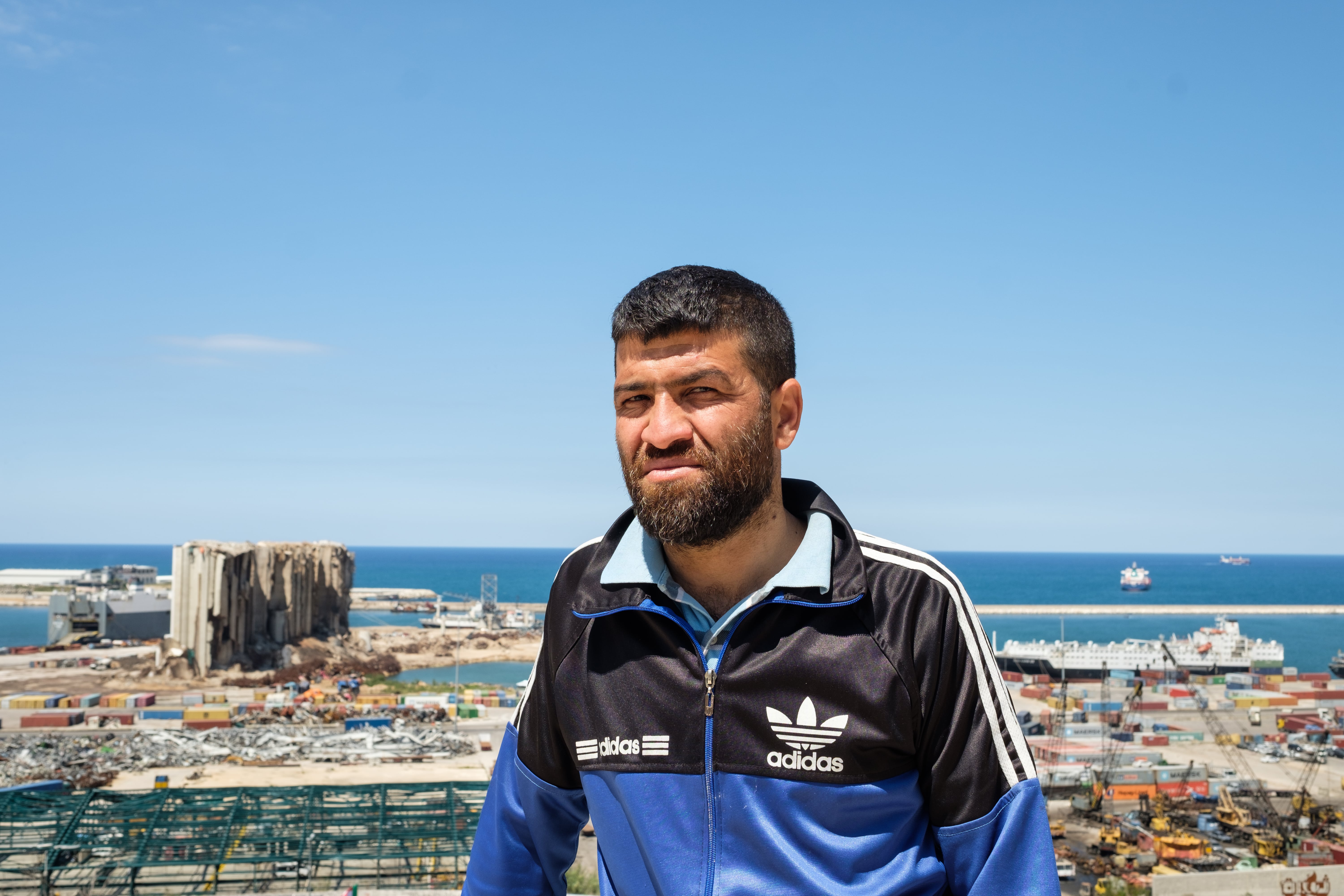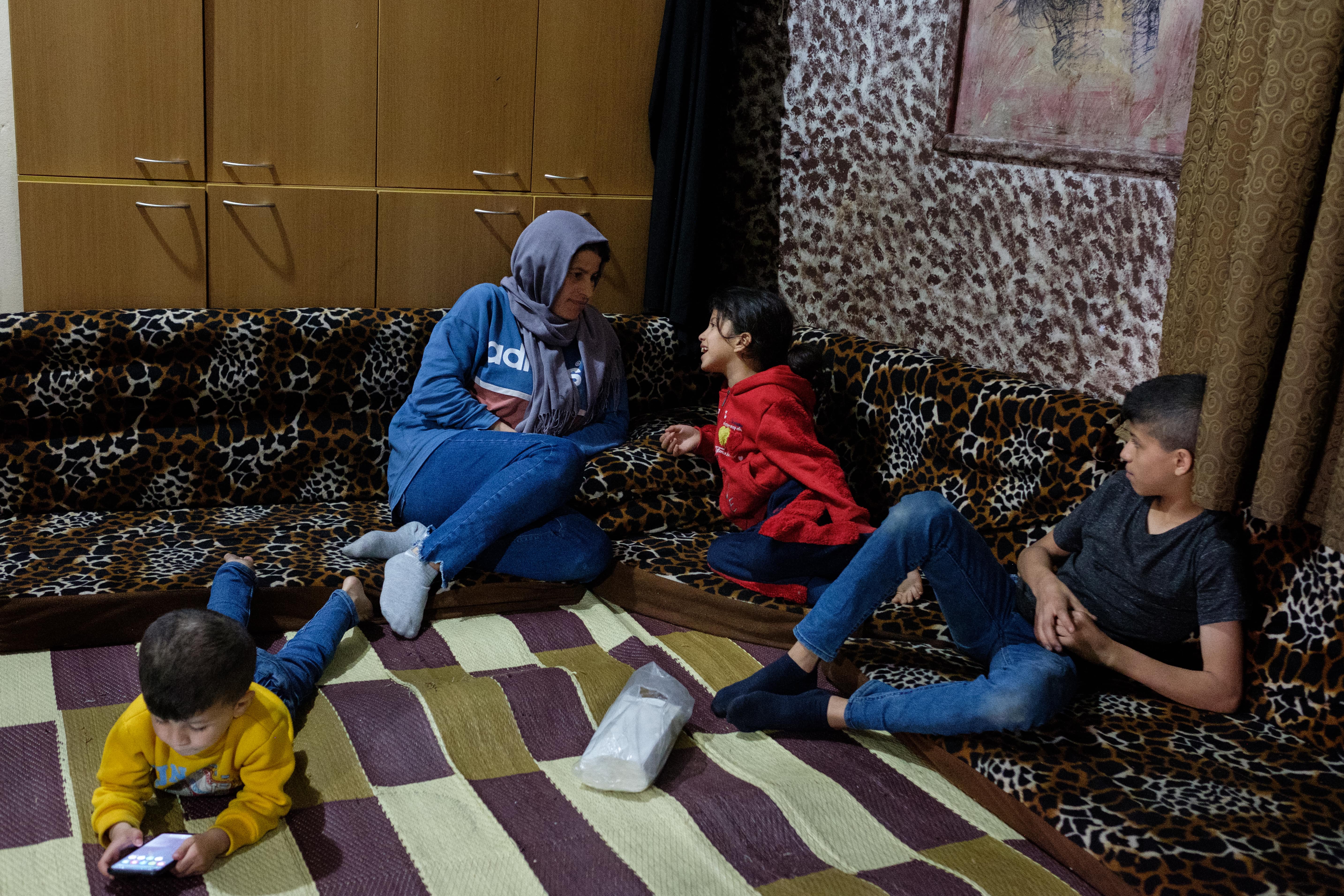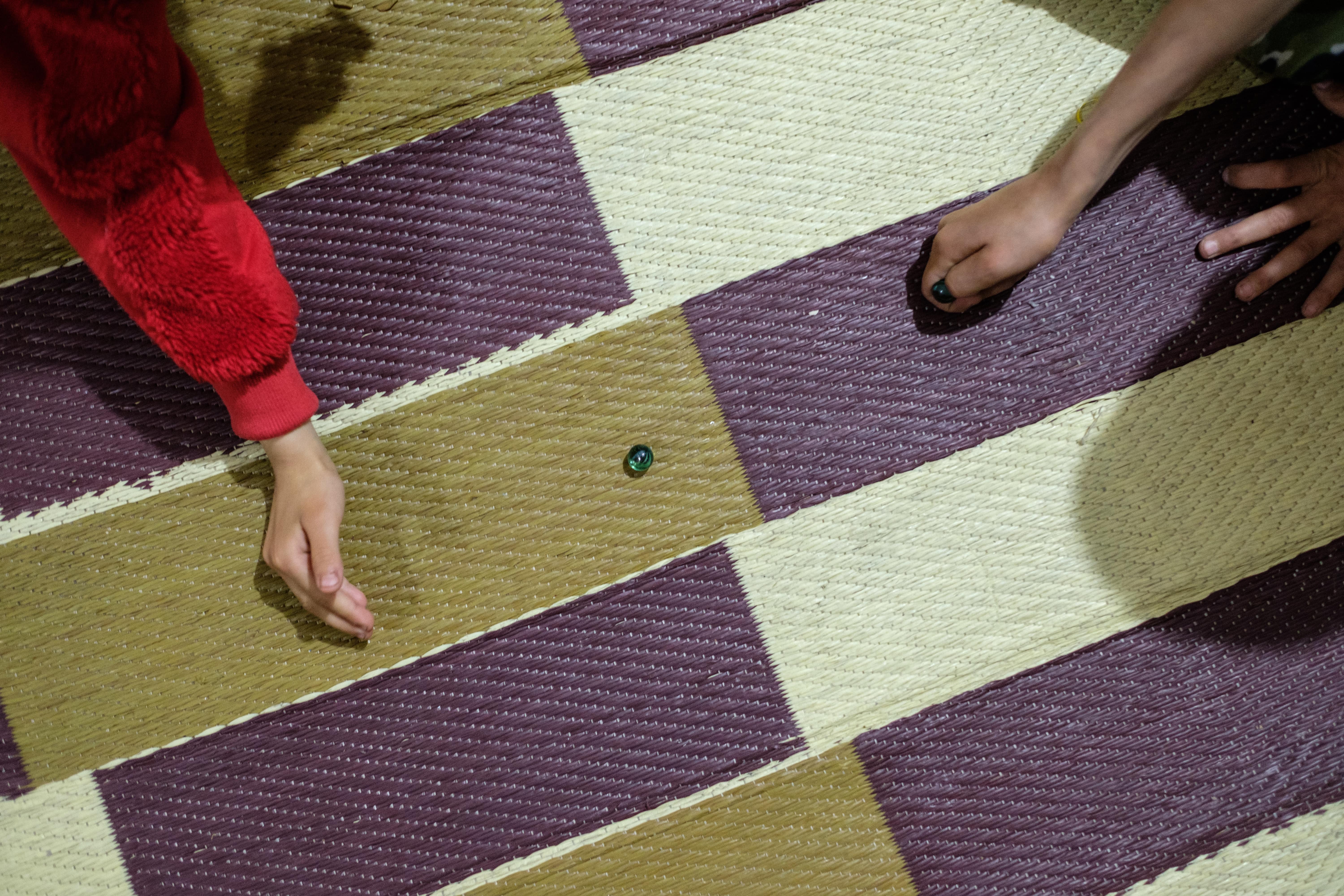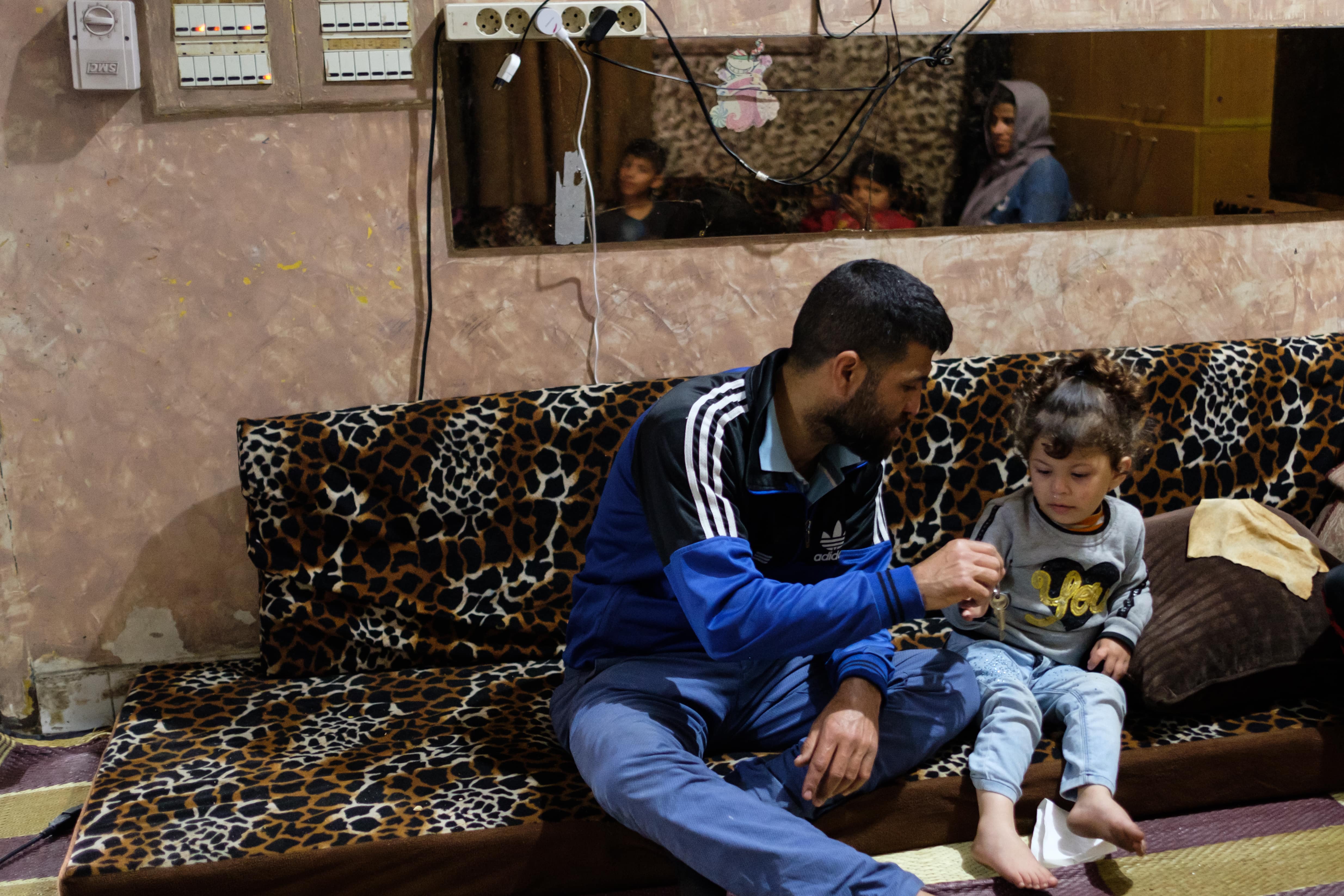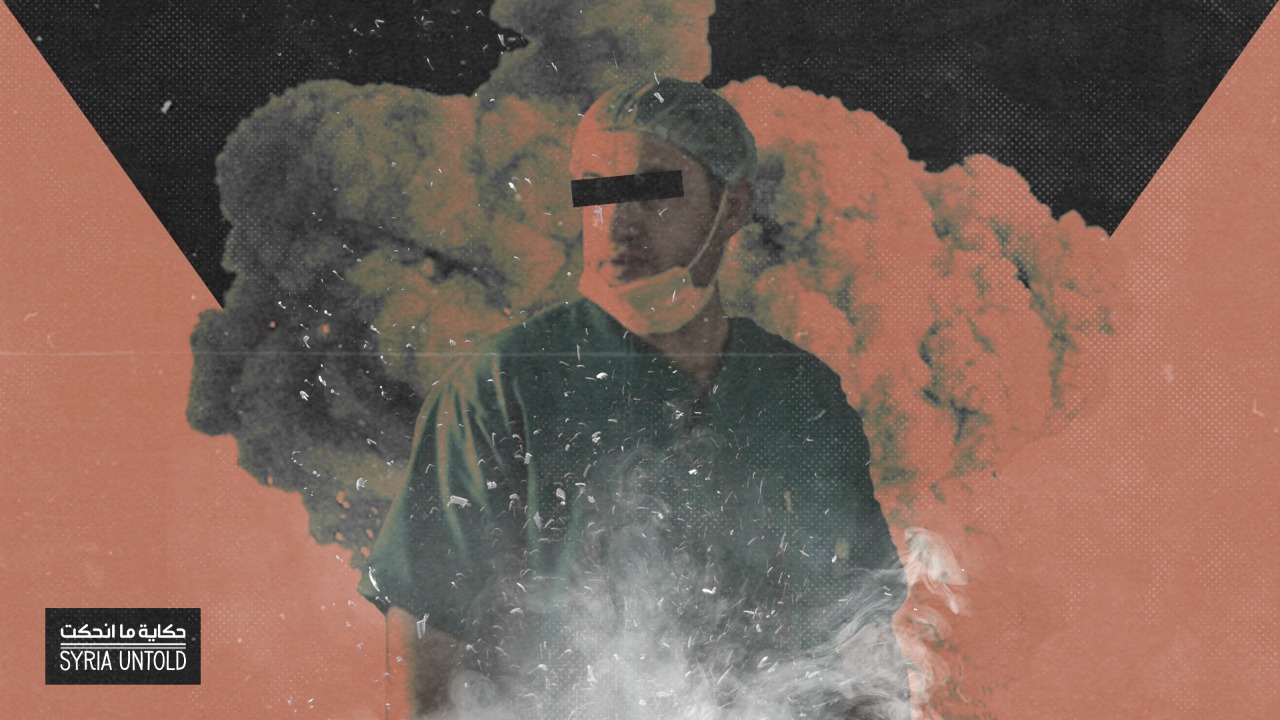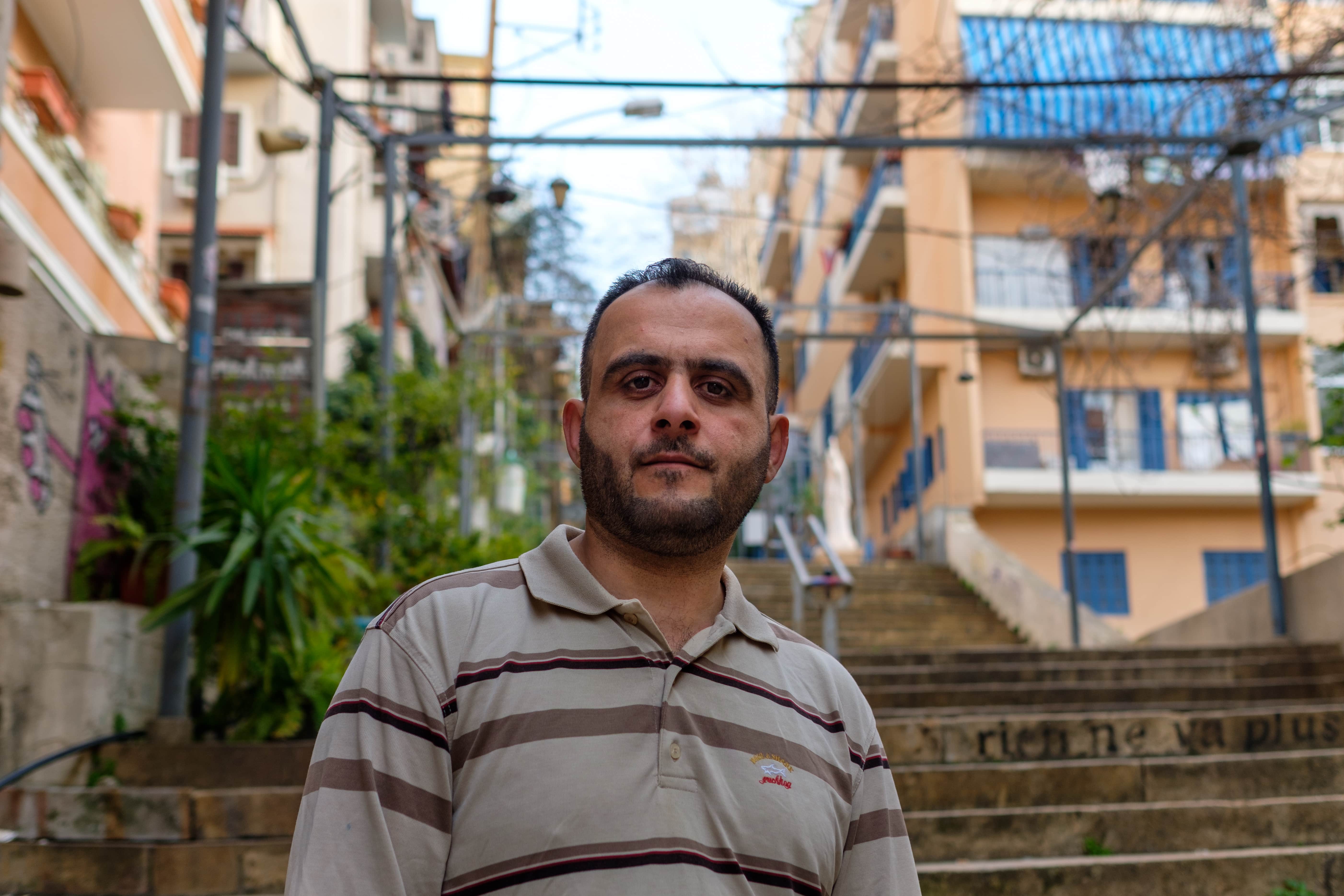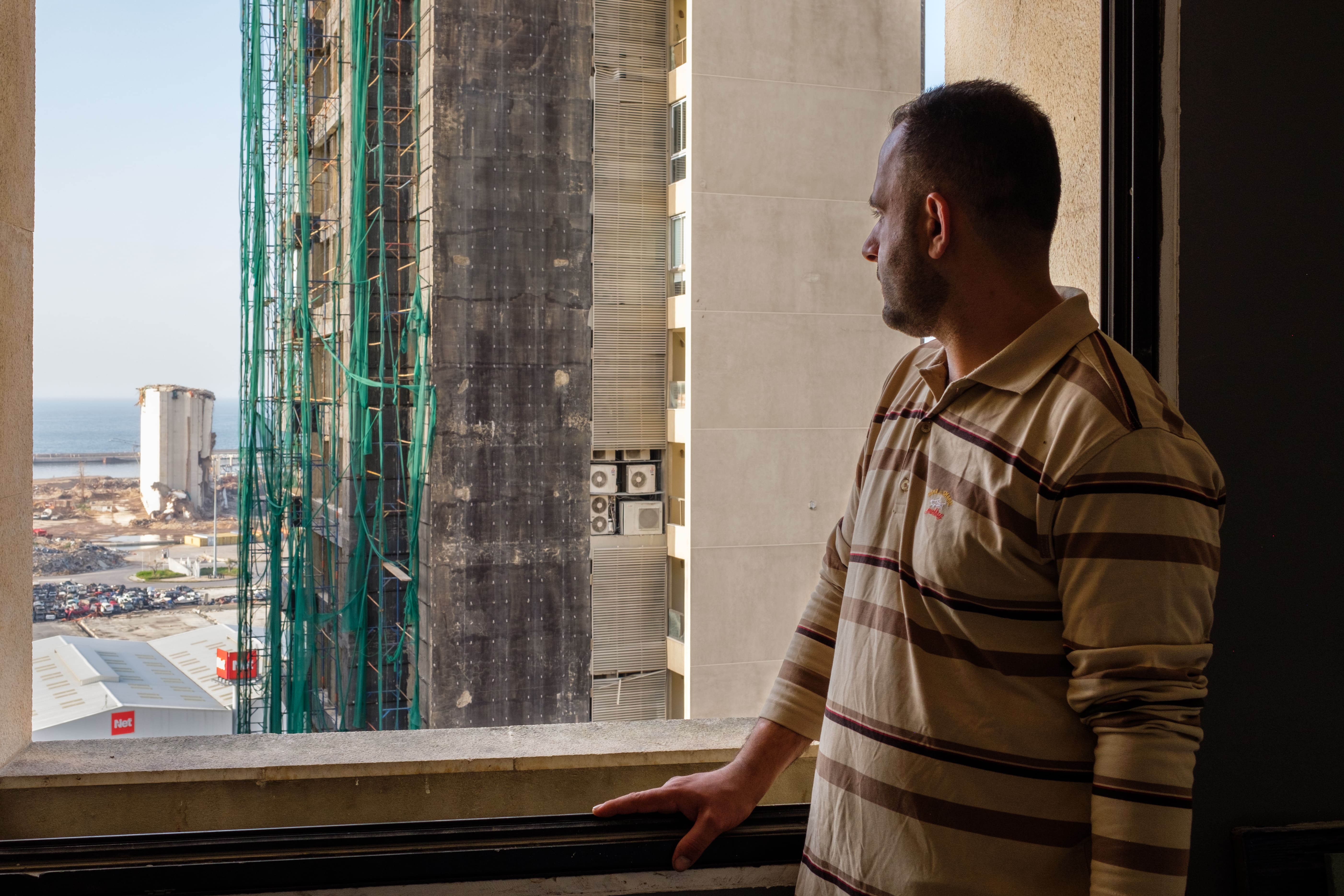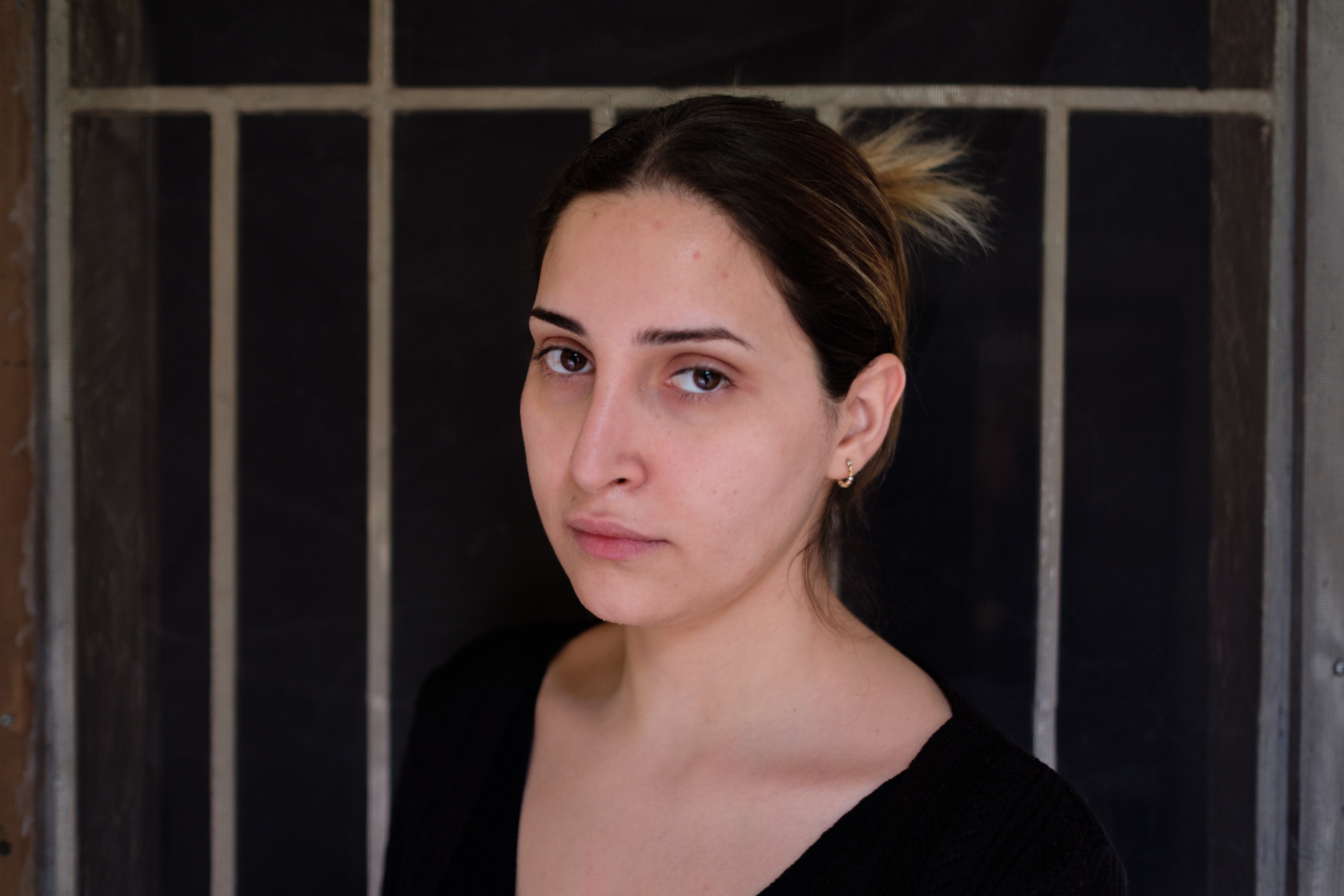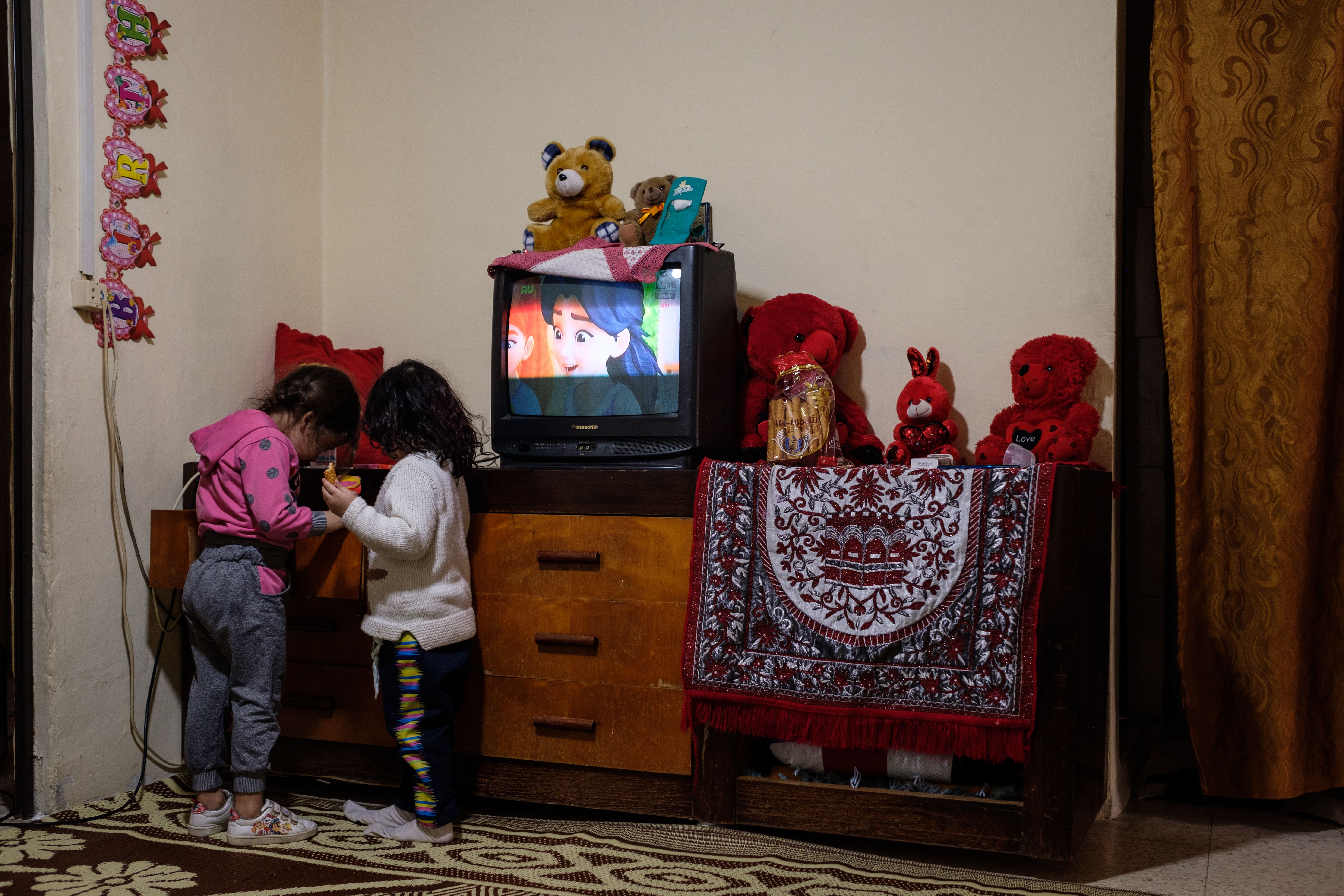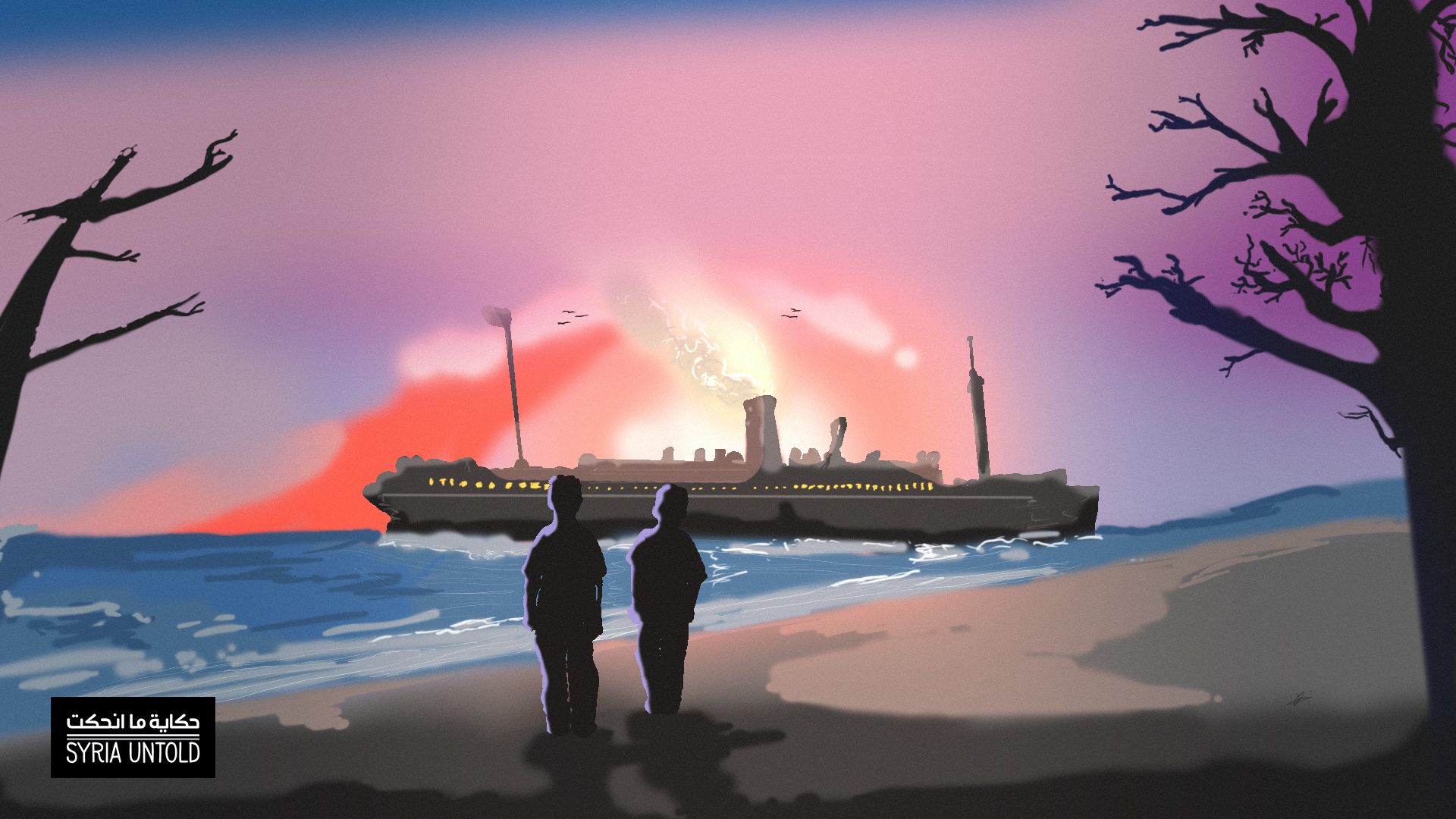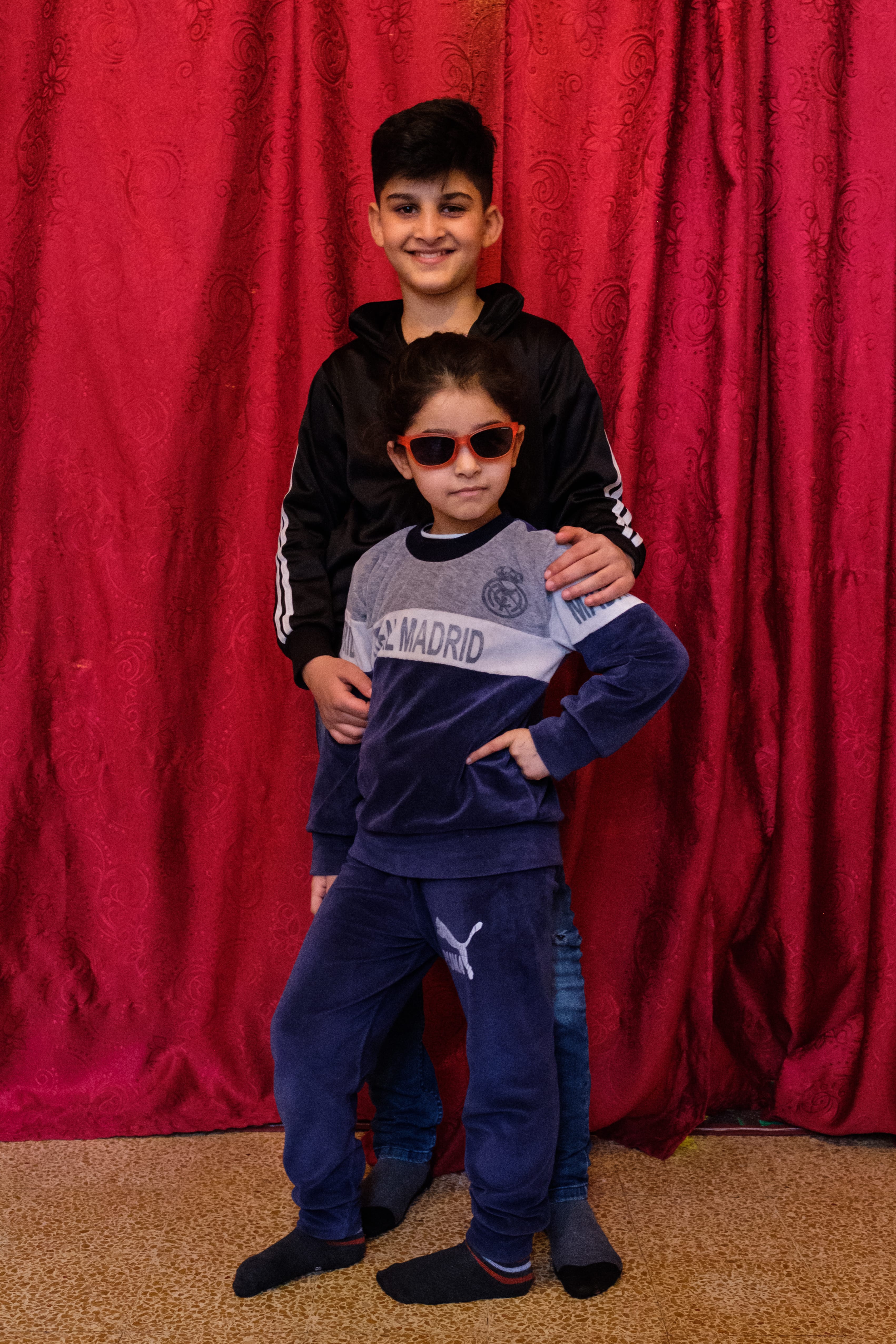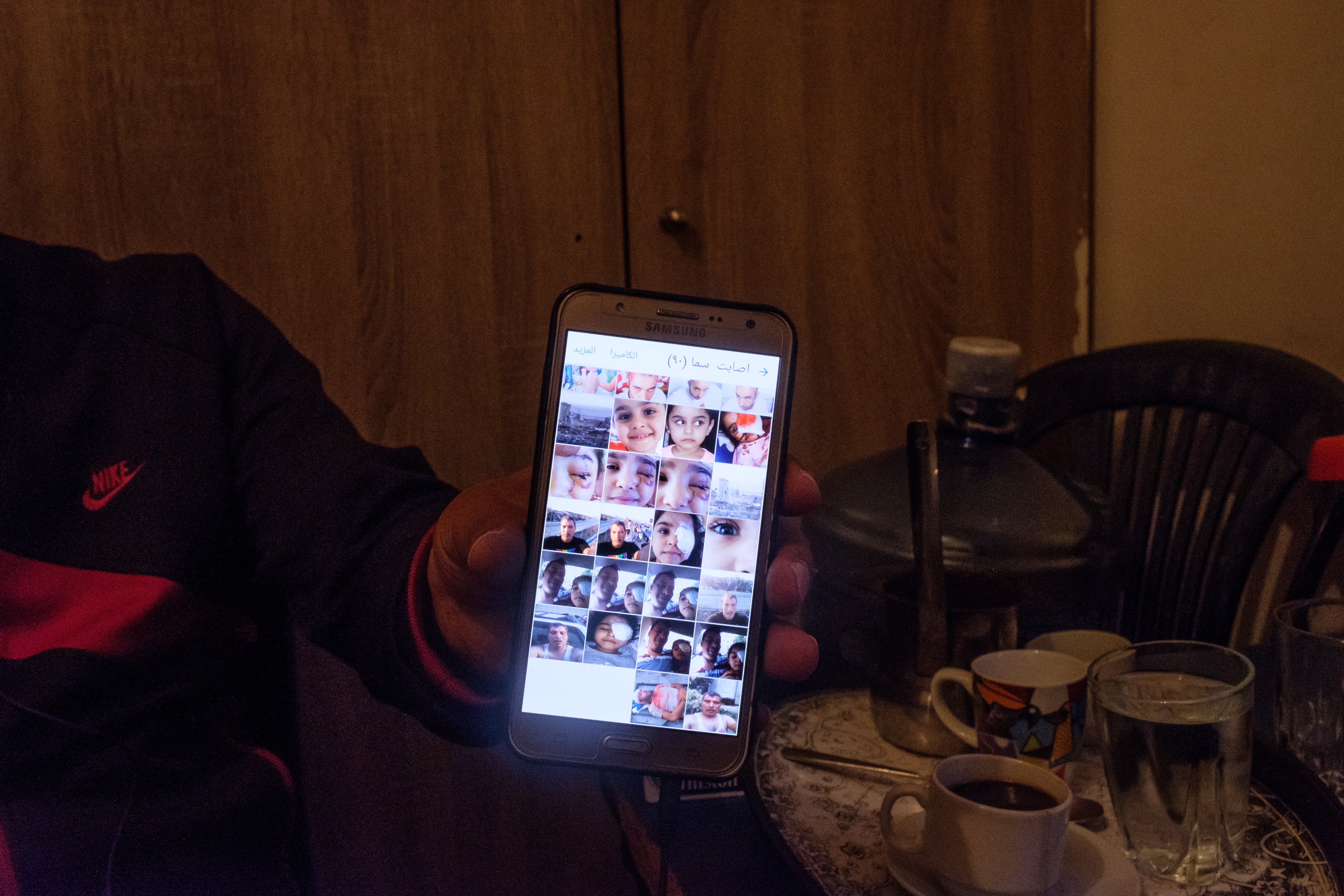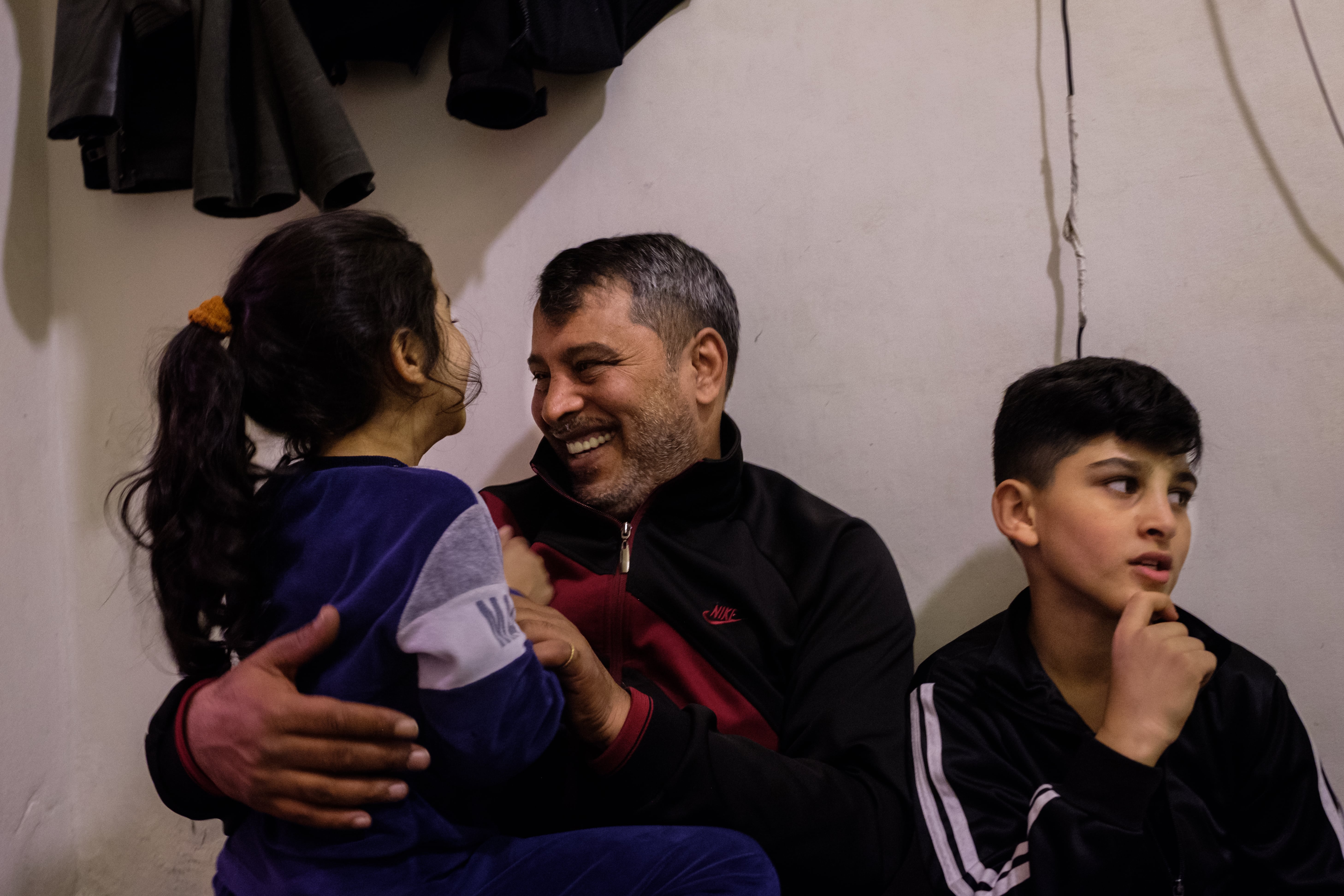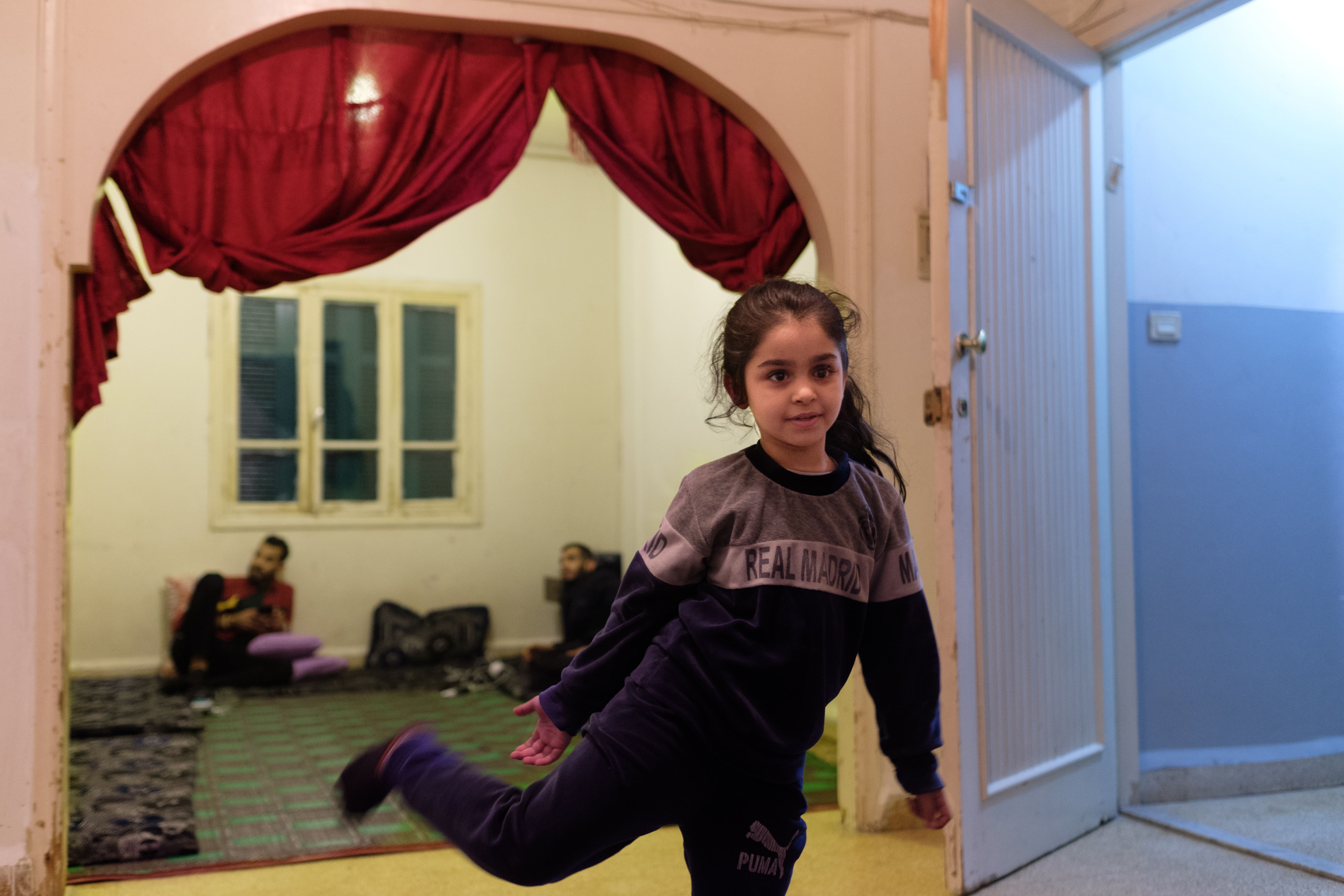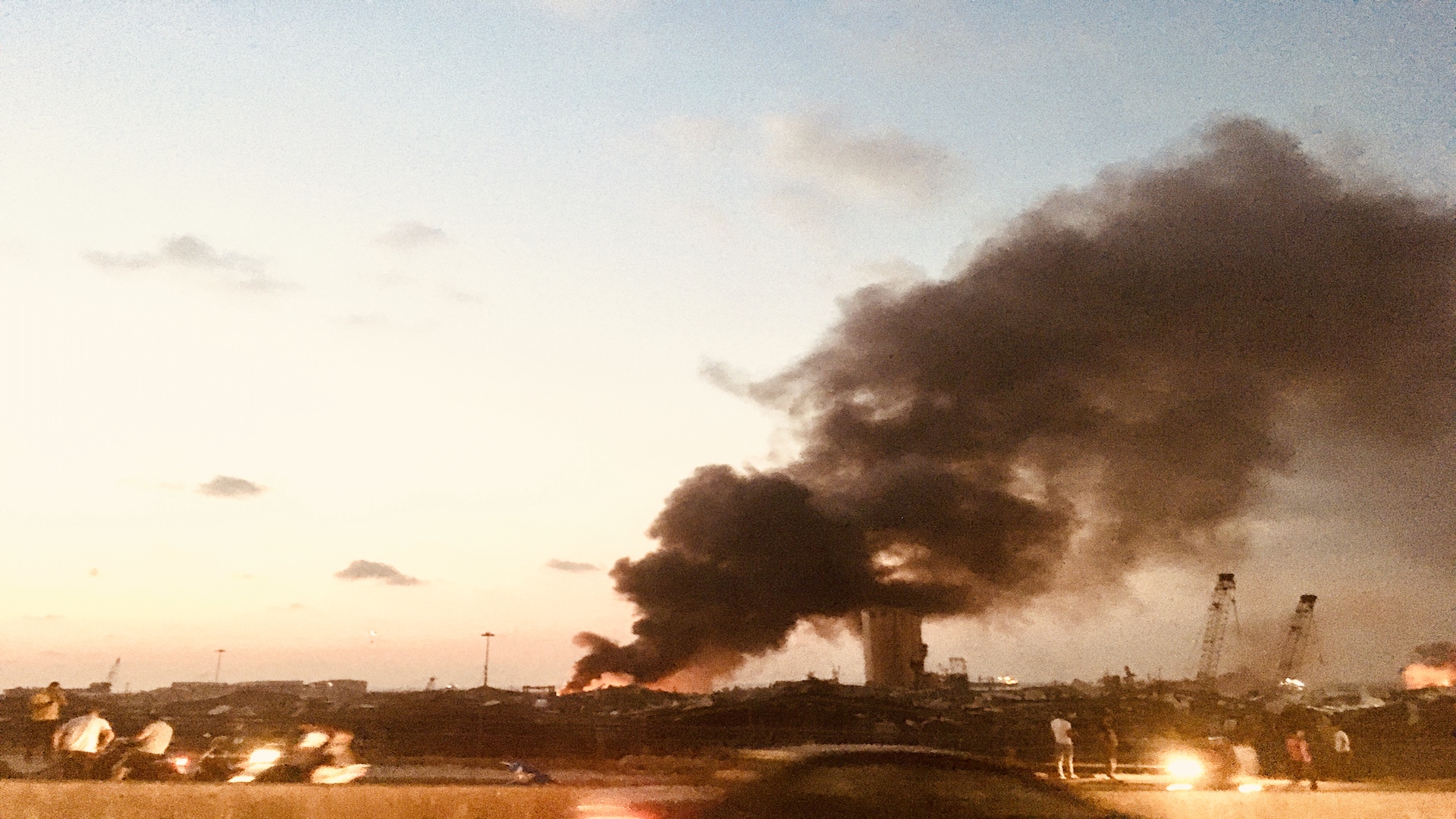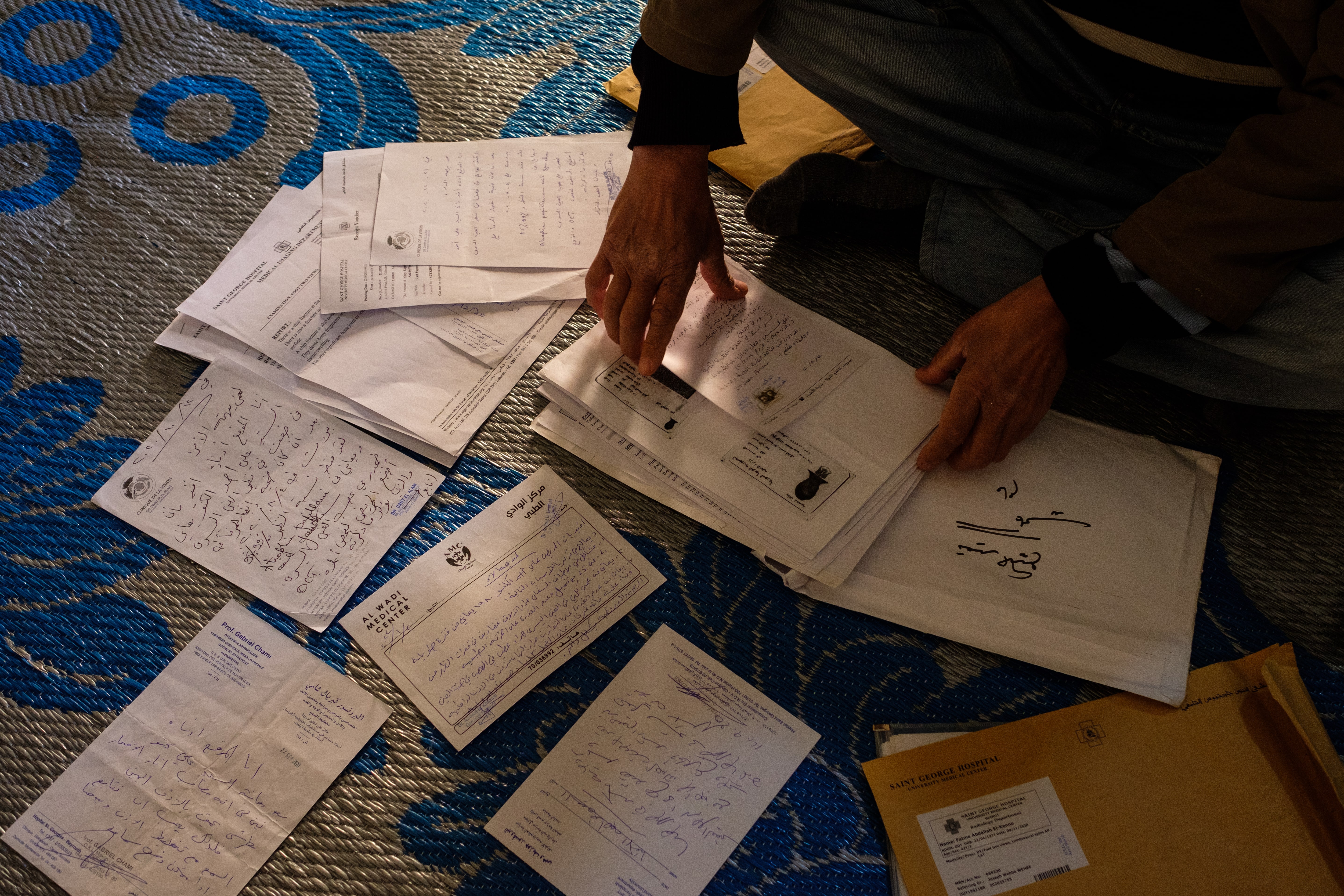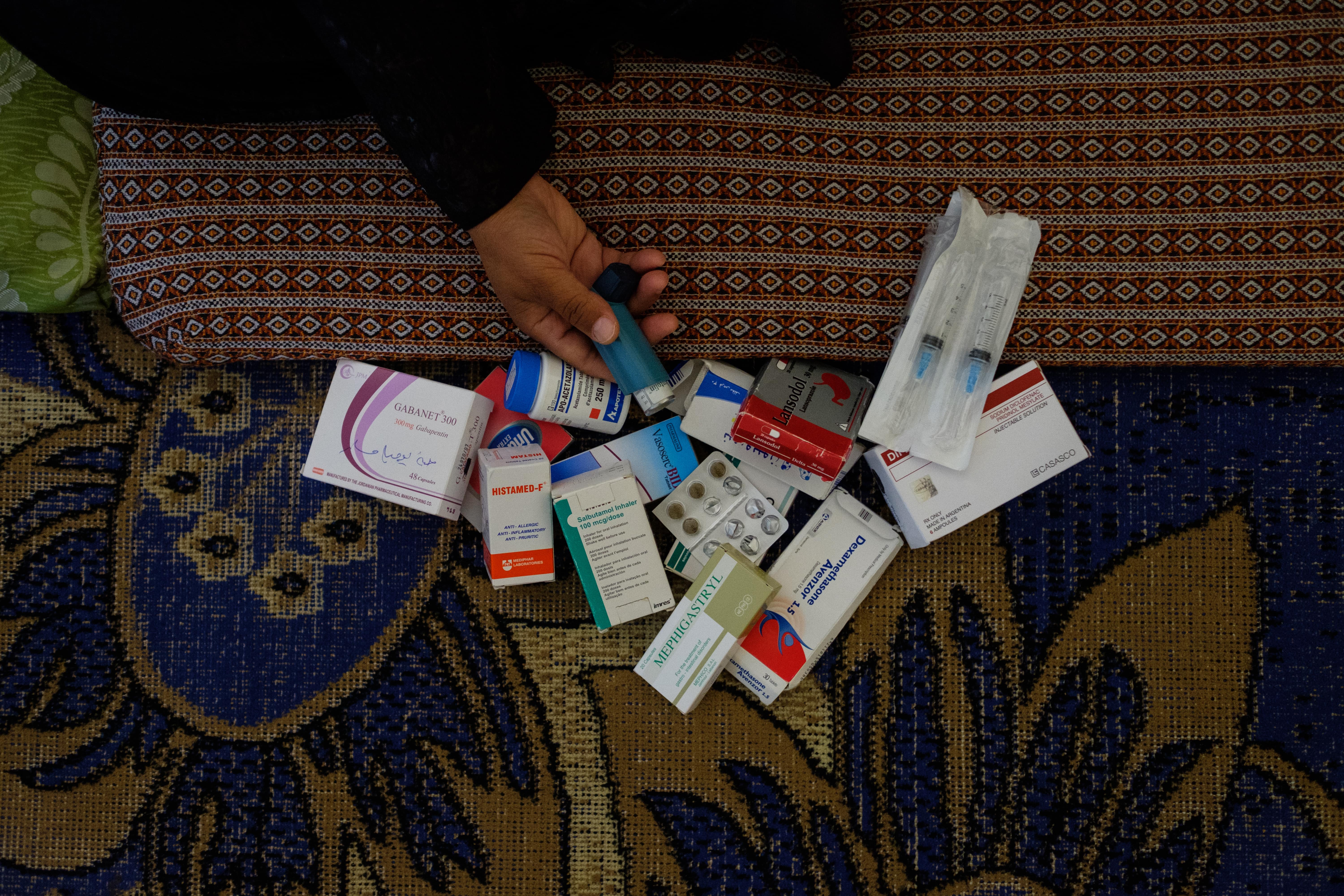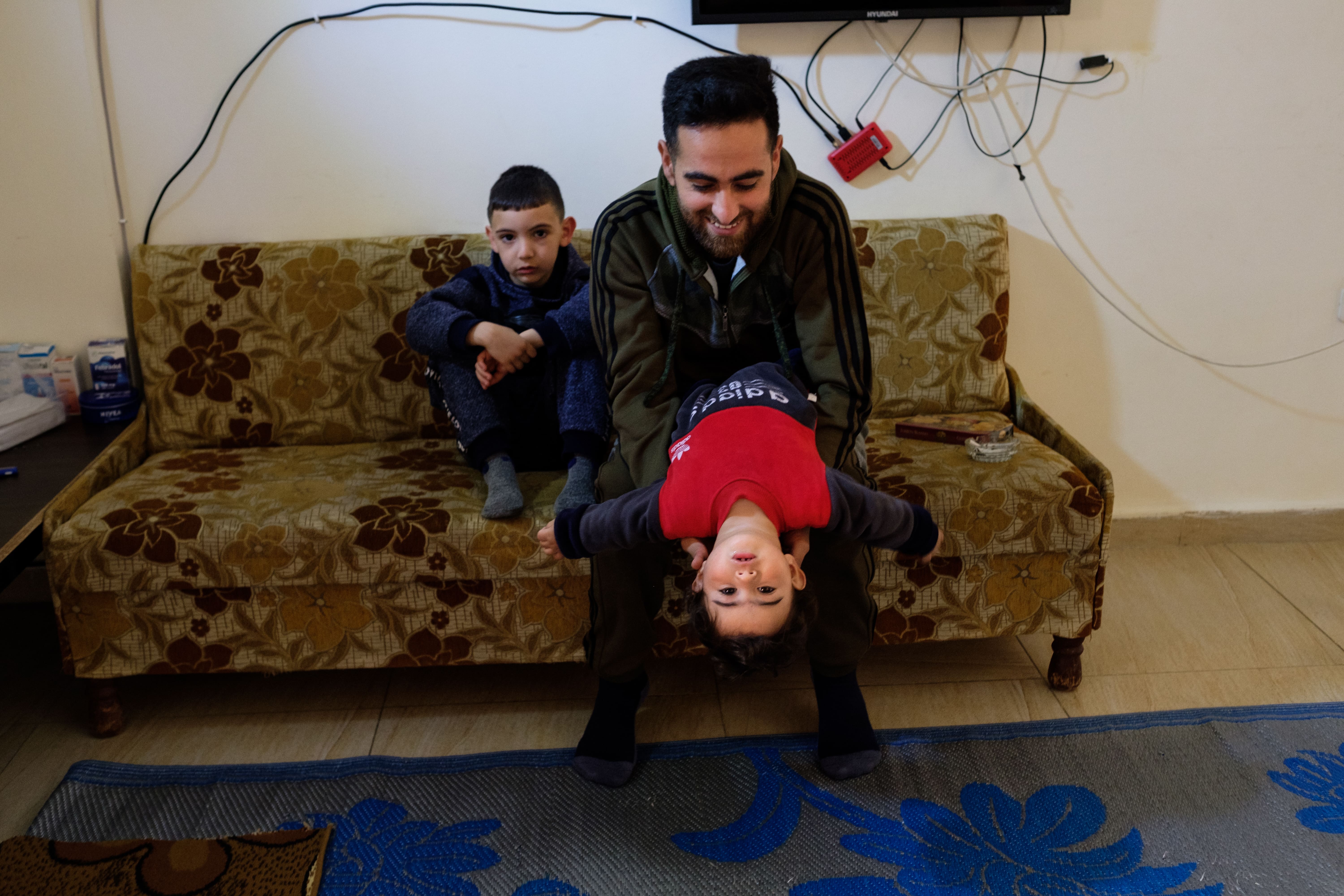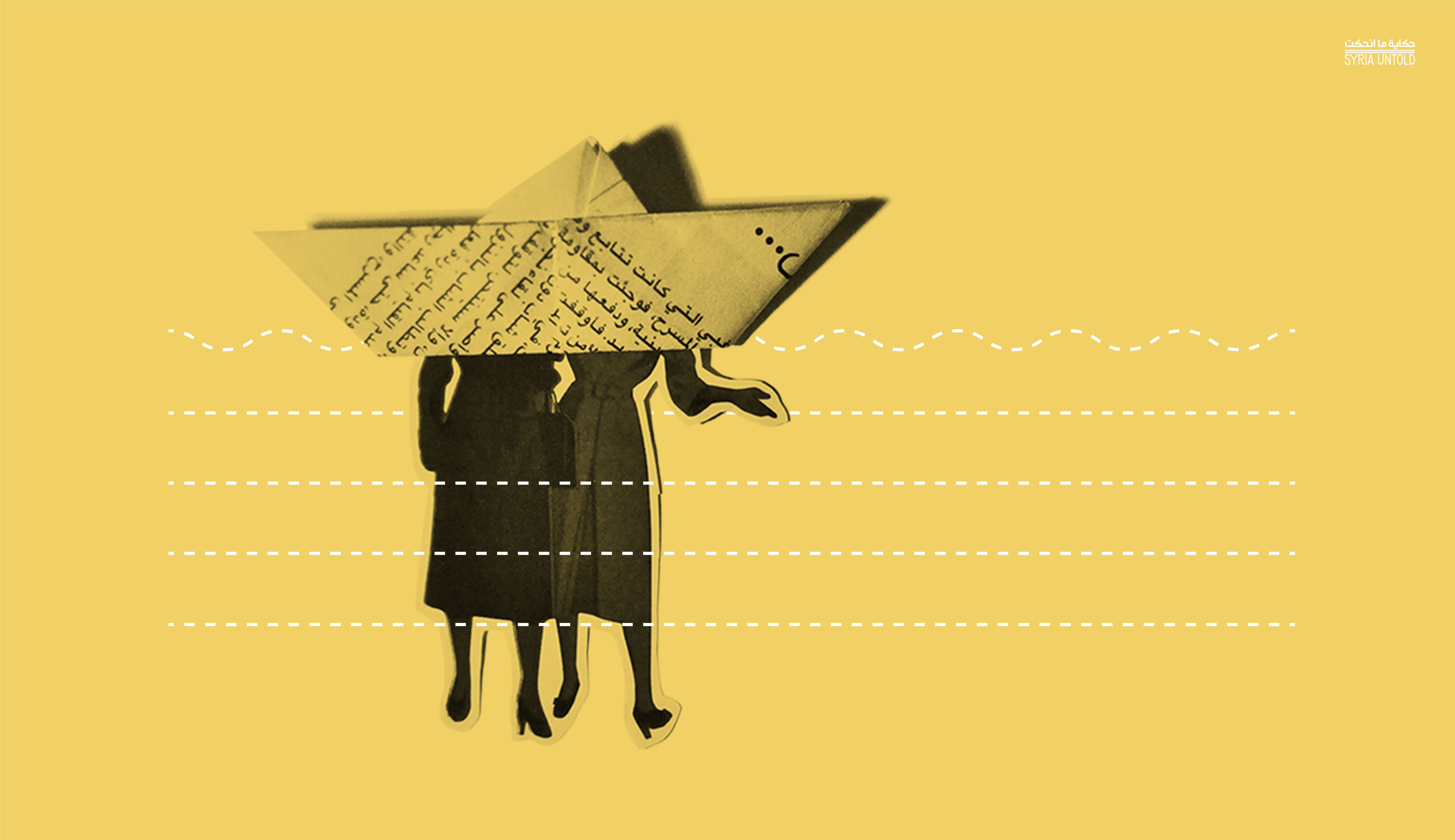This story is published as part of a partnership between SyriaUntold and the Network of Iraqi Reporters for Investigative Journalism (NIRIJ).
Photos by Rita Kabalan. Rita Kabalan is a Lebanese American photojournalist based in Beirut. Her work primarily focuses on displacement, social change and environmental issues.
The order to deliver a potato sandwich popped up on Jawad’s* phone shortly after five in the afternoon. Later, as he arrived with the delivery to the Beirut Fire Brigade in the Karantina neighborhood, someone told him that the young paramedic who had placed the order, Sahar, had left for the Beirut port, two minutes further down the road. Jawad drove a few meters in that direction, then everything went black.
It was 6:07 pm, August 4, 2020.
Jawad was among the approximately 6,500 people injured when nearly 3,000 tons of ammonium nitrate incorrectly stored at the port exploded after catching fire. Sahar Fares, the woman who had ordered the sandwich and a member of the firefighting team that had been dispatched to quell the initial blaze, was among the more than 200 people killed.
On paper, the Lebanese government and international aid agencies were meant to cover the medical costs for those injured in the explosion, including foreigners. But the reality on the ground played out vastly differently.
Since the day the ammonium nitrate explosion ripped through parts of Beirut, the injured have taken to the streets to protest the ongoing neglect by the Lebanese government. For Syrian citizens, the added layer of legal vulnerability they face in Lebanon has curtailed demands for proper healthcare and compensation. As a result, Syrians injured in the blast today say they are drowning in medical bills due to gaps in government and UNHCR coverage, as well as an oftentimes arbitrary response from Lebanon’s hospital system.
Among the injured are those now suffering from lasting disabilities and who need continuing, expensive medical treatment two years on.
A long wait for emergency care
When Jawad, himself a Syrian refugee in Lebanon, regained consciousness, much of Beirut was shattered. Debris and shards of glass littered the ground. All he could hear was a buzzing sound, he remembers. His eardrum had been damaged, he would later learn. Blood dripped from his head and he found his leg seriously injured. “My toes were where my heel was supposed to be; it was like it had overturned. I felt dizzy and I threw up,” the 28-year-old tells SyriaUntold and NIRIJ. He managed to contact his wife’s parents, who helped him reach a hospital. But the nightmare was far from over.
They found LAU Medical Center-Rizk Hospital, Rafik Hariri University Hospital and Sahel General Hospital, all in Beirut, overwhelmed with scores of injured and unable to take Jawad in. So Jawad’s in-laws drove him just north of Beirut to Aboujaoudé Hospital, where he says doctors sewed his head injury with 10 stitches. But they apparently could not treat his leg, so they drove further north, to Deir Saydet El Maaounat Hospital in Byblos. “There they told me I needed to do a surgery on my leg as fast as possible, but they couldn’t do it,” Jawad says. The doctors didn’t explain why. And so the family drove even further away to the Tripoli Government Hospital in northern Lebanon, but after hours in the waiting room, Jawad says they told him they could not accept him.
Finally, a hospital in northern Lebanon took Jawad in. He needed surgery urgently. “The hospital contacted UNHCR and told them, ‘This man has an injury in his leg, do you want to cover the surgery?’”
No answer came that night.
The following day, on August 5, as the Lebanese Minister of Public Health announced on TV that the state would cover the treatment of all those injured in the blast, Jawad sat with his broken leg in the hospital room in Akkar, Lebanon’s northernmost governorate. “It took UNHCR five days to answer the hospital, so I waited five days with my broken leg, taking painkillers,” he says.
He underwent surgery five days later, once UNHCR paid. However, despite having sought care at a hospital within UNHCR’s network, the UN agency covered only 75 percent of the cost. Jawad paid the remaining 25 percent of the bill, he says, around $428, according to the Lebanese pound (LBP)-to-dollar exchange rate at the time.
UNHCR spokespeople reached by SyriaUntold and NIRIJ via email maintained that the UN agency covered 100 percent of the medical costs for people injured in the blast who were treated at in-network hospitals. For Jawad, however, that was apparently not the case.
His story of navigating Lebanon’s medical labyrinth—and of eventually having to cover costs himself—is hardly unique.
An arbitrary response
Two photos of Cedra smiling adorn the otherwise bare living room walls of the al-Kenno family’s new home. The house sits on a quiet street in Jadra, a coastal town 25 kilometers south of Beirut. Originally from Aleppo, the al-Kenno family lived for years on the ground floor of a skyscraper facing the Beirut port. The father, Ali al-Kenno, worked as a concierge in that same skyscraper until August 4, 2020.
Early that evening, Ali, his wife Fatima, and their daughters Cedra and Hoda were gathered on the patio staring at the flames coming from the port. Then, the shockwave hit. Fatima felt something hit her back and she fainted. When she woke up, she saw her family lying on the ground. Fifteen-year-old Cedra never woke up. Ali and Hoda remained unconscious for hours.
Fatima, Ali and Hoda were taken to three different hospitals and, in a sign of the arbitrariness of the medical response to the blast, each was treated differently.
Eleven-year-old Hoda sustained a serious neck injury, putting her at risk of becoming paralyzed. “We went to Hôtel-Dieu and they told us she needed urgent surgery, that we should bring her to another hospital because they were not able to do it,” recalls her 28-year-old brother Mahmoud.
The Bekaa Hospital in Chtoura, about an hour’s drive away from Beirut, took Hoda in but asked the family to pay an exorbitant bill. “They had to put titanium worth $3,165 [in her neck], but we didn’t have that money,” says Mahmoud. Administrators from the Bekaa Hospital did not respond to SyriaUntold and NIRIJ’s requests for comment.
Historically, the healthcare system in Lebanon has been profit-oriented and highly privatized, rendering certain services inaccessible for many people, including Syrian refugees and anyone without sufficient medical insurance. Syria Untold tried reaching out to the Syndicate of Private Hospitals, to no avail.
Hoda stayed six days in bed with her neck broken until Molham Team, a Syrian-run nonprofit, stepped in and paid for the surgery. “I don’t remember the explosion because I lost my consciousness and when I was in the hospital, I wasn’t completely awake,” Hoda recalls. Twenty days later, she was discharged from the hospital with two titanium plates in her neck.
For Syrian victims of the Beirut port explosion, a year of grief and rage
03 August 2021
From Aleppo to Beirut, cities burning
26 February 2021
Hoda’s mother Fatima was injured in her back, neck and foot and says she was hospitalized in Al-Rasoul Al-Aazam Hospital in Beirut for 15 days. She underwent two surgeries that were covered by Lebanon’s Ministry of Public Health, in accordance with the government’s promises. “For two months I was not able to move. I used a bucket to go to the bathroom,” she remembers. Still, Fatima was the only injured family member who received the medical coverage promised to those wounded in the blast.
Meanwhile, her husband Ali was admitted to the Al Makassed General Hospital in Beirut with four broken vertebrae and a skull fracture. “They put staplers on his head, but it wasn’t well done, the two edges were on top of each other, and it became rotten,” explains his son Mahmoud.
Ali says he also lost sight in one eye and hearing in one ear. “When I told the doctor that I couldn’t see from one eye and I didn’t hear well, he told me I should go to a private doctor.” Al Makassed General Hospital couldn’t help him, he remembers the staff there telling him.
According to Ali, the hospital management told the family that foreigners were not covered and sent them a bill for LBP2,600,000, worth about $371 at the time. His son Mahmoud spoke with a journalist who told him they didn’t have to pay, so when Mahmoud confronted the hospital management, they were asked to leave, he says. It was day 17 of Ali’s hospitalization and his treatment wasn’t over, but they left the hospital. Two days later, his head injury worsened. “I was in pain, blood was still dripping, and it was bloating and infected,” Ali explains. The management of Makassed Hospital declined to comment for this story.
Ali then went to a field hospital that the Moroccan government had sent to help Lebanon in the aftermath of the port explosion. There, medical workers performed a brain scan and took him immediately to the emergency department. “The treatment there was good and for free,” says Mahmoud. “They fixed the stitching in his head, and they even gave us medicine for Hoda and Fatima.”
A labyrinth of healthcare coverage
The port explosion caused an almost immediate medical catastrophe. On the night of the blast, healthcare workers in Beirut dealt with more than 6,500 injured people in a shattered city where six hospitals, 20 clinics and 80 healthcare facilities were damaged, by the UN’s count.
The next day, the Ministry of Public Health (MOPH) announced in a circular that it would cover the costs of treatment in private and public hospitals for all the injured, Lebanese and foreigners alike. “We covered those who do not have insurance; those with insurance were covered with the insurance, with the MOPH paying the difference,” Dr. Joseph Helou, Head of the Medical Care Directorate at the MOPH, told SyriaUntold and NIRIJ. The ministry didn’t “distinguish between Lebanese, Syrian, Bangladeshi,” Dr. Helou maintained. Many Bangladeshi workers were also at the port when the ammonium nitrate stockpile exploded. “All the injured were treated in the hospitals.”
While most hospitals reportedly complied, others billed (or tried to bill) the injured, according to the testimonies gathered in this report. When asked about compliance with the MOPH circular, Dr. Helou said that “no hospital asked the injured for money.”
Fatima, Ali and Hoda were taken to three different hospitals and, in a sign of the arbitrariness of the medical response to the blast, each was treated differently.
The wounded tell a much different story. Five out of the nine people who spoke to SyriaUntold and NIRIJ for this report said they were asked by hospital staff to pay before receiving critical medical care. According to Dr. Helou, MOPH officials “haven’t received any complaint,” as the ministry and Lebanon’s National Social Security Fund (NSSF) were meant to pay the medical costs. He said he was “not aware” of any instances of the MOPH and NSSF failing to cover such costs, and that he had not heard that people wounded in the blast had publicly protested against the authorities’ neglect of their healthcare needs.
The neglect stems not only from a faulty application of the August 2020 circular but also from the circular's shortcomings, legal experts say. “Once the injured got out of the hospital and wanted to go back in due to complications or additional treatment, the hospitals did not consider them covered under the MOPH,” explains Ghida Frangieh, a lawyer at Legal Agenda, an advocacy organization.
“The immediate medical attendance happened but the follow-up did not, so the injured were left on their own,” adds Samira Trad, director of the Frontiers Ruwad Association. An NGO based in Lebanon, Frontiers Ruwad is active on refugee issues and has helped several non-Lebanese port blast victims and family members of the dead to claim their rights.
Anwar Mustafa endured those shortcomings. The 36-year-old construction worker was filming a cell phone video of the port fire from his rooftop on August 4, 2020. He was around 500 meters away. Soon after he began filming, the ammonium nitrate stockpile was detonated, and the explosion rocked Beirut. “I lost consciousness and woke up in the hospital at 8 am the next day,” Anwar says. “My head was bleeding, and I couldn’t move my neck or my back.”
His initial 22-day hospitalization at Hôpital Français du Levant in Beirut was covered by the MOPH, but the dozens of subsequent doctor’s visits, X-rays and physiotherapy sessions were not, according to Anwar. “Once I left the hospital, I paid everything.”
Anwar keeps a notebook where he carefully catalogs his medical expenses: LBP250,000 to visit an “ear specialist” after he lost his balance when walking, LBP400,000 for a blood test, LBP200,000 per physiotherapy session for his back. Last April, he stopped the rehabilitation sessions. He cannot afford them anymore. According to the notebook, Anwar’s family now sustains a debt of $18,000, half of it related to his medical treatment alone, and the other half to living expenses for himself, his wife and six children.
One month after the blast, the MOPH issued a circular asking those injured in the explosion to pursue all their treatment, scans, and tests in Lebanese hospitals at the ministry’s expense—but that was apparently just on paper.
In reality, the injured—Lebanese and non-Lebanese alike—became lost in bureaucracy.
“They were asked to create a file with the MOPH in order to continue their treatment in the hospitals,” Frangieh, the lawyer, explains. “But then it was quite difficult to follow up on all the bureaucratic issues and the victims never had any guidance of what to do.”
Dr. Helou told SyriaUntold and NIRIJ that the MOPH had informed hospitals on how to proceed. “The MOPH informed the hospitals that for whoever comes, they do surgery.”
“But if someone does a surgery and doesn’t come to tell me, how do you want me to know?”
“In Lebanon, there is absolutely no plan, and the victims were left alone to sort their problems individually.”
‘How are we going to pay?’
In the aftermath of the explosion, Lebanon’s healthcare sector received $15.5 million of a required $33.3 million through the UN-coordinated Flash Appeal 2020. Those funds were destined for emergency treatment of traumatic injuries, reconstructing damaged health facilities and assisting remaining healthcare facilities to care for the “surge” of patients no longer able to access the damaged hospitals, according to Christina Bethke, Health Sector Coordinator for the World Health Organization (WHO).
But ultimately, the past few years have devastated Lebanon’s healthcare sector. Since the start of the economic crash in 2019, the spiraling devaluation of the Lebanese currency has rendered imports, among them medical supplies, a nightmare. The World Bank dubbed Lebanon’s financial woes as among the top three most severe economic collapses worldwide since the 1850s.
Amid all this, though Lebanese authorities issued circulars and passed Laws 194/2020 and 196/2020 ostensibly granting rights to port blast victims, the injured and their families, the government didn’t allocate a budget.
COVID-19 reveals the reality of governance in Syria
07 November 2020
A decade of attacks on Syria’s hospitals, and the medical workers who learned to survive
06 April 2021
“If they want to make a law and tell the MOPH to pay the costs, then the government needs to give the MOPH a budget,” Dr. Helou said. “The responsibility is all on the government, not the MOPH,” he added. “Unfortunately, until now the hospitals haven’t received the money for the cost of the treatment.”
Indeed, the historical debt from MOPH and NSSF to hospitals is a structural problem in Lebanon predating the blast.
At the same time, the MOPH agreement with hospitals remains at the official LBP1,500-per-dollar exchange rate, while the actual market rate at the time of publication is around LBP29,700 per dollar. “At the 1,500 LBP rate, no hospital will accept my payment; I can’t tell the hospitals to work and I don’t pay,” Dr. Helou said.
The harm the past three years have wrought on Lebanon’s healthcare system can be told through the spiraling devaluation of the country’s currency alone. The MOPH’s budget is LBP475 million—three years ago, when the official LBP1,500 exchange rate still applied across the country, that budget was equal to $330 million. Today, that is only about $16 million.
Neglecting the disabled
Among the more than 6,500 people injured in the port explosion, it is not clear exactly how many acquired disabilities. By the time of publication, the Ministry of Social Affairs (MSA), the government body supposedly in charge of assisting those disabled by the blast, counted only 15 people who had contacted them and received an official disability card, which is meant to grant certain benefits.
The actual number of disabled is far higher. The Lebanese Union for People with Disabilities (LUPD), an NGO that has supported the injured with cash, rehabilitation sessions, diapers, prosthetic limbs, wheelchairs and hearing aids since the blast, was able to reach around 500 of the injured who were coping with disabilities, says the group’s emergency coordinator, Nada Ozeir. Of those 500 people, 350 had a previous physical disability and 150 had acquired a disability due to the port blast. Among them were 10 Syrians who were disabled by the blast and 20 who had a previous disability, according to Ozeir. “There are so many persons with disabilities beyond the ones we targeted, but we couldn’t reach out to all of them,” she says.
The staggering gap between the 500 people identified by LUPD and the 15 reached by the MSA seems hard to explain. Abdallah Ahmad, General Director at the MSA, attributes the ministry’s low reach to the fact that some injured “didn’t ask us for help…sometimes they don’t want to come to the MSA due to corona, the economic conditions or [because they must] gather the necessary documents.”
According to Ozeir, many people remain on the waiting list to obtain the government’s disability card because the MSA “sometimes doesn’t have employees or electricity.” Other times, when patients visit the doctor to receive the medical report required for the card, “the doctor is not there, has corona, or the center has closed,” she says.
The government laid out special provisions for port blast victims left disabled by their injuries in Law 196/2020, which refers them to Lebanon’s Disability Law 220/2000. The law allows disabled people to receive a card that grants them certain exemptions and provisions of medical equipment like wheelchairs.
“The disability law is problematic because it is not implemented, so they basically refer them to something that is not practical,” according to Frangieh, the lawyer from Legal Agenda.
Even then, foreigners were not included in these benefits. Abdallah Ahmad says the MSA “tried to coordinate with UNHCR and other NGOs” on the matter, but that those efforts led nowhere.
‘Army martyr’ status?
There is one other possible avenue for assistance. The LUPD has advocated for those injured in the blast to gain “army martyr” status, which would, in theory, grant them a monthly pension, free healthcare and children’s enrollment in school. Under Law 196/2020, people killed by the explosion were granted martyr status, which is meant to give their surviving family members certain benefits. Could the same status be applied to the wounded? “The life of this person has changed 100 percent, many can’t work now due to the disability they acquired in the blast,” argues LUPD coordinator Ozeir. On the other hand, Ahmad says this demand is “not logical” because it would “open questions among the rest of the disabled or injured in other explosions—many people could ask to get the same status.”
Families of non-Lebanese people killed in the blast were also left out of the “martyr” status. “The text of the law itself doesn’t say it is limited to Lebanese only, but in practice when we asked how to proceed to obtain it for non-Lebanese, the response was that it was impossible,” says Samira from the Frontiers Ruwad Association.
“Once I left the hospital, I paid everything.”
According to Dr. Helou, “The state doesn’t have the right to give a state pension to a non-Lebanese,” and that it would need a new law to do so.
In any case, the al-Kenno family wasn’t eligible to obtain “martyr” status after they lost Cedra, and they were unable to obtain a disability card. They did receive a one-time payment of LBP30 million from Lebanon’s Higher Relief Committee, alongside other blast victims, but say they spent half that amount simply gathering the official documents they needed in order to prove their family status to receive assistance in the first place.
Gaps in UNHCR coverage
All the Syrians whom SyriaUntold and NIRIJ interviewed for this report are UNHCR-registered refugees, except for Anwar, the injured construction worker and father of six. UNHCR covers the medical cost only for registered refugees, though “there is a mechanism in place to fast-track registration,” according to a UNHCR spokesperson.
Even so, UNHCR stopped registering Syrian refugees in 2015, at the request of the Lebanese government. Today, of the estimated 1.5 million Syrian refugees living in Lebanon, only about 839,000 are registered with UNHCR, according to UN data. The rest are left largely to their devices and often seek assistance from NGOs.
UNHCR spokespeople told SyriaUntold and NIRIJ that, for UNHCR-registered Syrian victims of the port explosion, “100 percent of the hospital costs were covered” by the UN agency. But in some instances, that did not appear to be the case. Jawad, the worker who was injured as he was delivering a sandwich near the port, says had to pay 25 percent of his hospital bill.
Asked about the instances where Syrian refugees had not been covered, UNHCR spokespeople stated that “there might also have been cases where individuals sought hospital care outside the network of hospitals that UNHCR works with and that UNHCR did not know about.”
That’s what Uafa says happened to her. Originally from Homs, Uafa now lives as a UNHCR-registered refugee in Lebanon. Though she was in the Mar Mikhael neighborhood near the Beirut port at the time of the blast, she was not injured. Her 10-year-old daughter Malak, though, suffered an injury to her eyebrow that needed stitches, and her husband Bilal, who was working as a delivery driver for a restaurant in Mar Mikhael, was injured in his foot.
Neither Malak’s nor Bilal’s injuries were life-threatening. The family tried three hospitals in Beirut, but those facilities were overwhelmed. “I don’t blame these hospitals, they were busy with emergency cases,” says Uafa.
Uafa’s husband Bilal was eventually accepted in Hôtel-Dieu, another Beirut hospital, and received 22 stitches in his leg. The family was billed $250, says Uafa, which they paid. Malak was treated at St. Joseph Hospital in Dawra, just outside Beirut. She received 11 stitches in her eyebrow, after which the family was asked to pay $350. Uafa says the doctor insisted that the stitches were considered “cosmetic surgery” and she had to pay, which she did. “Even if it is a private hospital, they shouldn't ask us for that money,” says Uafa.
The forgotten railways of Syria and Lebanon: Tales of a missed connection
29 October 2021
From Ottoman Syria to Argentina
02 August 2021
A source at St. Joseph Hospital explained that for Lebanese injured by the explosion, they sent the bills to the MOPH, but for non-Lebanese injured, “in some cases” they billed the patient. The General Director of Hôtel-Dieu, Nassib Nasr, declined to comment on specific cases “for confidentiality reasons.”
Uafa’s family paid a total of $550 to sew shut Bilal and Malak’s injuries. They say they were unaware that the treatment was supposed to have been free. According to Uafa, the family reached out to UNHCR after the blast, but the UN agency didn’t cover the cost.
Besides problems in implementation, the UNHCR coverage itself has some gaps. According to UNHCR spokespeople who provided a written statement to SyriaUntold and NIRIJ, the UN agency has covered “hospital interventions in the direct aftermath of the blast” and “most hospital-related expenses, except for outpatient and chronic treatments.” That excludes long-term physiotherapy, outpatient care and other care provided at primary healthcare centers. For instance, the spokespeople said, UNHCR would not cover expenses for “a person that does an X-ray as part of an investigation initiated from a primary health care provider but is not admitted to the hospital and goes home straight after the X-ray is done.”
But for many of those injured on August 4, their medical needs—and expenses—lasted long after their initial hospital visits that day. Many of them, not only Syrians, have been left on their own when it comes to paying for scans, prosthetic limbs or repeated rehabilitation sessions.
Only a handful of NGOs, such as LUPD, have filled that gap.
Adib is one LUPD beneficiary. Originally from Aleppo, he now lives with his 10-year-old son in the Mar Mikhael neighborhood near the port, where he works in a carpentry shop. The explosion injured his legs, leaving him unable to walk for six months, he says.
Adib’s brother managed to pay LBP600,000 for a leg brace, as well as additional costs to cover visits to private doctors.
Later, Adib says, LUPD covered the cost of 25 physiotherapy sessions and gave him cash assistance. Despite having received extensive help relative to some others injured in the blast, Adib says he remains unable to work at the carpentry shop to the same extent as before.
One ray of hope
One day this past April, a spring breeze drifts through the open windows in Makhoul al-Ahmad Mohamed’s house, in the Beirut neighborhood of Geitawi, near the port. Those windows were also open the day of the explosion. Makhoul remembers his five-year-old daughter Sama leaning out and watching the rising smoke on the horizon.
“I was here in the window, I called my sister to come see the fire and then…I don’t know what entered my eye,” Sama, now seven years old, explains. A piece of debris pierced her eye after flying into the house through the window. “This one is fake,” she says, pointing at her left eye.
The same night of the blast, Sama was taken to LAU Medical Center-Rizk Hospital. She lost her left eye, but doctors managed to save the connecting nerve. “The doctors told me that the surgery cost LBP12 million, but they had been informed that the MOPH was covering the costs,” Makhoul, Sama’s father, says.
In Sama’s case, unlike so many others, the rules were followed. The doctors began her surgery that night.
Later, Makhoul visited different private doctors at his own expense to hear different opinions. Since the surgery had preserved Sama’s nerve, that meant she would be able to wear and move a glass eye. He contacted UNHCR, who suggested that he take Sama to Al Makassed Hospital, but he wasn’t convinced they had specialized doctors.
Sama’s story soon spread across international news headlines and captivated a wide audience. UN High Commissioner Filippo Grandi visited her family during a trip to Beirut in the aftermath of the blast. The Emirates Red Crescent covered Sama’s second surgery, worth $3,000, with a specialized glass eye doctor. The organization has also promised to pay for the continued renewal of Sama’s glass eyes as she grows and needs replacements until she is 18 years old.
Sama has since attended rehabilitation sessions and learned how to adapt to her glass eye. And most recently, the family was granted resettlement through UNHCR, to Canada.
Just a few days ahead of the flight to Canada, Sama announces she is aware that in Alberta, where they were to be resettled, people speak English. “I speak English, my name is Sama,” she recites. She then asks in French, with a big smile: “Comment tu t’appelle?” What is your name?
Makhoul looks on, proud. His daughter has become popular in her school in Beirut, he says. She is learning French, as well as yoga and taekwondo. As if on cue, Sama interrupts her father and sings a French song before jumping to the floor and doing the splits.
The family says they feel a sense of relief at their upcoming trip to Canada. “We are going to a country where there is security,” says Makhoul, “a country that cares about its citizens.”
“It’s a nice feeling.”
What compensation rights?
Beyond healthcare coverage, victims of the port explosion should be entitled to claim financial compensation, advocates say.
“Compensation is something that is supposed to bring you back to the situation you were before you were harmed,” according to Frangieh, the lawyer from Legal Agenda. “You compensate for the psychological harm or missed opportunities—for example if someone stopped working” due to injuries.
Frangieh criticizes the absence of any state initiative towards compensation. “In Lebanon, there is absolutely no plan, and the victims were left alone to sort their problems individually.”
“Regardless of how the fire started on the 4th of August, the cause of the damage is the storage of the nitrate for years in the warehouse,” Frangieh says, placing responsibility on Lebanese officials. Evidence gathered in a sweeping 2021 Human Rights Watch report indicated that senior Lebanese government officials "were informed of risks posed by the ammonium nitrate and failed to take the necessary actions to protect the public.” By law, “the state has a responsibility to compensate any damage that comes from the storage of hazardous material,” adds Frangieh.
Besides the state, insurance companies and “people who have been found criminally guilty,” in the ongoing trial over the Beirut blast would be the three actors that would have to compensate victims who choose to file criminal lawsuits for their injuries and other losses, says Frangieh.
In theory, Syrians injured in the blast—including refugees who aren’t registered with UNHCR—could join Lebanese victims in asking the state for compensation. “A person can be compensated even if their residency status is not legal, but they would have to file a lawsuit,” explains lawyer Youmna Makhlouf, also from Legal Agenda.
Yet, Syrians interviewed in this report largely ruled out filing such lawsuits. According to UNHCR, 84 percent of Syrian refugees lack a residency permit in Lebanon. This puts them in a state of legal vulnerability. For Syrians, joining a lawsuit in court to demand compensation often seems a far-fetched scenario. This hesitation owes to the “general problem in Lebanon of accessing the law for vulnerable categories” of people, says Makhlouf.
Anwar, the father of six, says he can’t work anymore as a construction worker due to his back injury. Adib, meanwhile has seen his ability to work in the carpentry workshop curtailed due to his knee injury. Neither of them considered asking for compensation.
“The owner of the workshop is Lebanese,” Adib says. “Until now he didn’t receive any compensation to fix his workshop—do you think that me, a Syrian, will get compensation?”
In the workplace, employees could hypothetically ask for compensation from the company they work for, provided they have an official contract and work permit. Another far-fetched scenario for many Syrians.
Bilal, the former delivery worker, lost his motorcycle the day of the blast and was unable to work for months afterward. “He worked with no insurance or contract, he can’t ask for his rights,” says his wife, Uafa.
And Jawad couldn’t walk for three months after the blast due to his leg injury. When he contacted his old workplace, they told him they didn’t have a place for him anymore. “I can’t complain to the company,” he says. “I am Syrian. I can’t do anything.”
Thanks to rehabilitation sessions provided by LUPD, Jawad has recovered but says he can no longer run or carry weight. He needs additional surgery to remove the metal screws from his leg, but he is reluctant.
Jawad found another job as a delivery worker to make ends meet for his wife and six-year-old son. The family has since left their rented flat in Mar Mikhael because it was too heavily damaged by the blast, finding a new place to live in Antelias, north of Beirut. In exchange for taking care of the building, Jawad’s family is allowed to live in a small room on the ground floor with two hours of electricity per day. Every day he dreams of resettlement. “We are in a country that doesn’t like Syrians. Let us go to any country—send me to Sudan or Nigeria. The important thing is to leave Lebanon.”
South of Beirut, in Jadra, the al-Kenno family also longs for new life. They say the debt they’ve taken on to pay for tests and medicines for Hoda, Ali and Fatima now stands at LBP25 million, about $900 at the market rate at the time of reporting. After the blast, NGOs Caritas and Basmeh & Zeitouneh provided them with cash assistance and an orthopedic corset for Ali; the rest was all on them.
Ali opens a foldable sofa and shows dozens of bills and medical records hidden inside. “Look, a visit to the doctor is 250,000 liras, this X-ray 500,000.” Fatima, his wife, opens her medicine box and begins reciting the use of each pill inside. “I still take each medicine every day,” she says. The meager salaries of the couple’s two sons, alongside monthly UNHCR assistance, is their only income.
For Ali, 15 years working as a concierge abruptly ended that August 4. “The day of the explosion, [the building owner] just left me, there’s no compensation for foreigners,” he says. Due to his injuries, he can no longer walk long distances. “I can’t carry weight, I’ve lost eyesight, I’ve lost hearing and I feel like I lose my balance when I walk. Where am I going to work?”
Before the blast, Ali would wake up every morning to take on his concierge duties. Now, every morning at 6:30 am, he says he walks to the end of his street in Jadra and watches the people waiting to be picked up by the white public vans. “I watch them waiting on the highway to go to work,” he says. “I see them going to work every day.”
“I just stand there.”
*Jawad is not his real name. He requested a pseudonym for safety reasons.
Edited by Madeline Edwards


